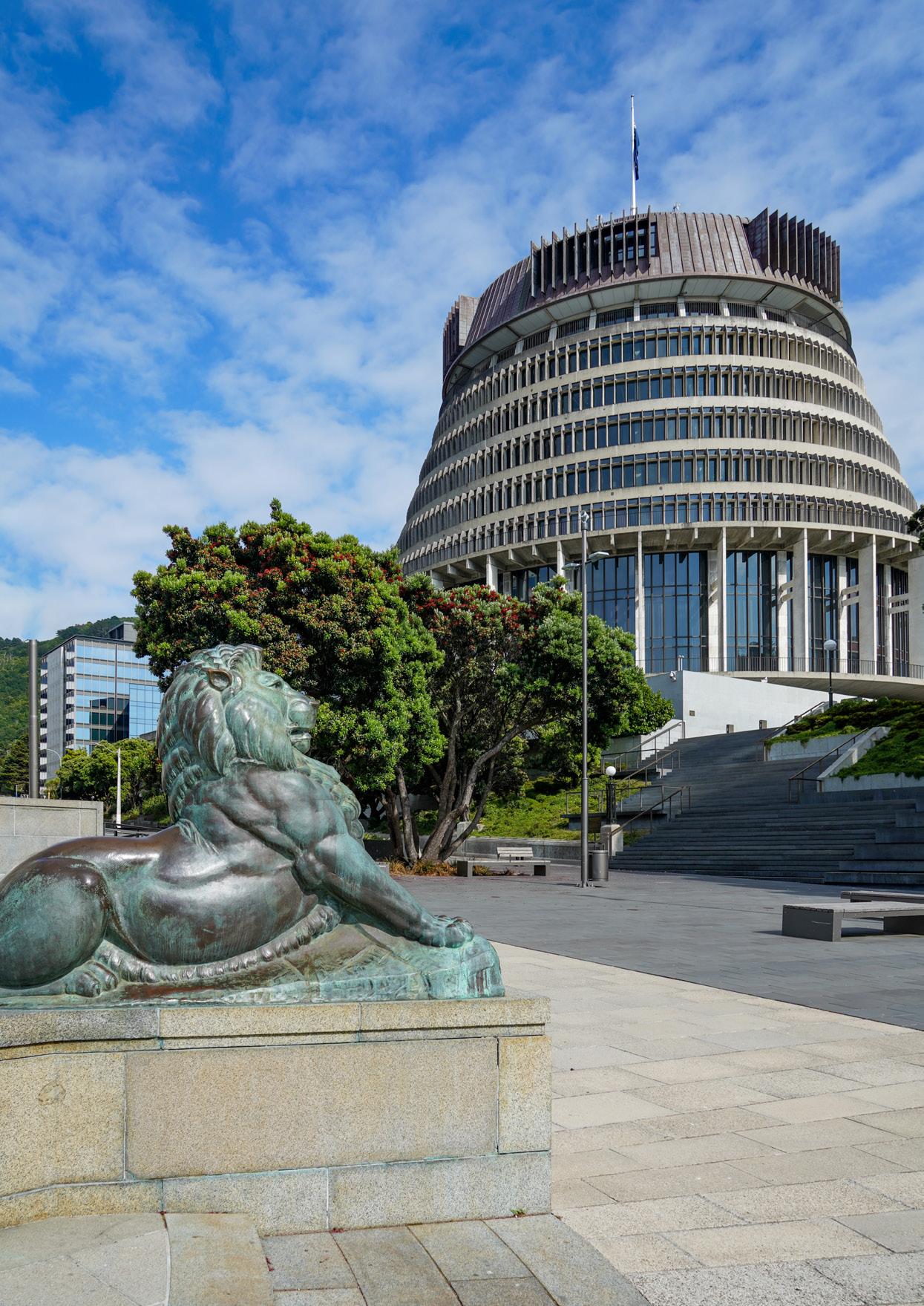
SPRING 2023 Election 2023 special



Scan this QR code with your phone to see what our customers have to say Available in the cloud Having to change systems? Choose OneLaw. NZ owned, operated and supported Pain-free onboarding and migration process Helpdesk satisfaction rating of 98-99% PLS New Lawyers Membership Offer One year’s free membership* to new members who join in their first year of practice *Or part thereof Find out more at lawsociety.org.nz/pls-member
ABOUT LAWTALK
LawTalk is published quarterly by the new Zealand Law society | Te Kāhui Ture o Aotearoa for the legal profession. It has been published since 1974 and is available to every new Zealand-based lawyer who holds a current practising certificate.
DISCLAIMER
unless it is clearly indicated, the views expressed in LawTalk are not to be taken as those of, or endorsed by the new Zealand Law society | Te Kāhui Ture o Aotearoa. no responsibility whatsoever is accepted by the Law society for any opinion, information, or advertisement contained in LawTalk
CONTACT DETAILS
publications@lawsociety.org.nz
pO Box 5041, Wellington 6140, new Zealand DX sp 20202
ADVERTISING
For advertising placement:
advertising@lawsociety.org.nz
PRINTING AND DISTRIBUTION
Blue star, petone, Wellington Issn 0114-989X (print) · Issn 2382-0330 (Digital)
PEOPLE
Frazer Barton, president
David Campbell, Vice president Auckland
Caroline Silk, Vice president Central north Island
Ataga’i Esera, Vice president Wellington
Taryn Gudmanz, Vice president south Island
Katie Rusbatch, Chief executive Officer
STORY SUGGESTIONS
Do you have a suggestion for a story idea you think would be interesting for an upcoming issue of LawTalk? email: publications@lawsociety.org.nz
Issue 955 ∙ s pr I ng 2023
***** FPO ***** Placeholder for FSC Certificate ***** FPO ***** navigating our future by Frazer Barton ................................................ 04 election 2023 special Feature ......................... 06 A clearer, fairer, more accessible democracy: Independent electoral review seeks to future-proof new Zealand’s electoral system ............................................... 20 Law society response to Independent review ........................................ 24 Making risk-informed decisions to combat the cost of natural hazards .............................. 28 QP v ZH: Lawyer disciplined for transferring funds to clients’ own bank account by Kristine King ................................................ 32 Advocacy in Action - Term in review 36 Access to Justice and Duty solicitors: update from the desk of the Legal services Commissioner by Tracey Baguley 40 september is wills month: golden conversations on leaving a legacy in a client’s will by Eleanor Cater 42 spotlight on ILAnZ 46 Contents 3
Navigating our future
BY FRAZER BARTON
Next month’s election comes at a critical time for the legal profession and for the Law Society. As many of you will already know, the Independent Review recommended legislative and structural change, the establishment of a new independent regulator and an overhaul of the system for handling complaints about lawyers.
The Review was commissioned by the Law Society in 2021 because it had been clear that the complaints process was no longer fit-forpurpose and was not serving the public or the profession well. This had been highlighted in 2018 with reports of sexual harassment within the legal profession.
It is fair to say the views of the profession are not unanimous. On each of the Independent Review Panel’s recommendations, views from the profession range from accept to reject. However, most of the recommendations have either been accepted or accepted in principle by the Law Society. There are some recommendations that the Law Society considers require further consideration. No recommendations have been rejected by the Law Society.
During all stages of the Independent Review there was considerable opportunity for the profession to engage, and a range of views
expressed and considered. To ensure the response was transparent, the Law Society published the Council responses for each recommendation, and also the indicative support from the profession.
If new draft legislation eventuates, there will be further opportunities for the Law Society and individual lawyers to comment on the Bill through standard policy and legislative development processes.

It’s unclear as to what priority the incoming government will place on this. We at the Law Society have made our position clear – and we’re focussed on the future of the profession. A more modern regulatory environment is needed given the changes that have taken place in New Zealand and internationally since the Lawyers and Conveyancers Act was introduced in 2006.
In the meantime, we have made considerable progress in line with
the Review Panel’s conclusions. We’re moving forward on a number of actions that are aligned with the recommendations. A new regulatory strategy is in place and this has been a significant step forward on our transformation journey to modernise the Law Society’s regulatory functions and ensure our services are responsive.
We are also working on our future strategy as a membership body. The Law Society is responding to the profession’s call to be an even stronger voice as a national representative body by working on our representative strategy. The Law Society provides extensive geographical support through 13 branches across the motu, from Tāmaki Makaurau right down to Southland. We offer support for three practice areas through the Inhouse Lawyers, Property Law and Family Law sections, and these are highly valued by the profession. Our new strategy aims to build on this
LAWTALK ∙ KŌ rer O MŌ T e T ure
4
and provide even more value for members, all the while ensuring the long-term financial sustainability of the Law Society’s representative services.
Our representative strategy will be discussed at our October Council meeting. The Law Society is intending to introduce a membership subscription in 2024 to support the delivery of these services.
One thing is clear though, our representative function is vital. It is valued by members and plays a critical role in supporting us to deliver our purpose as a kaitiaki of an exemplary legal profession. I encourage you to take advantage of the many services your Law Society already offers.
As our recent advocacy supporting lawyer wellbeing and duty lawyer remuneration demonstrates, the Law Society is a strong voice that other organisations reach out to,
listen to, and collaborate with. We believe it vital that the Law Society retain a strong representative function and act as an advocate for principles such as access to justice.
An example of success through advocacy, which we often undertake in collaboration with other organisations, was the significant announcement in July by the Legal Aid Services Commissioner that duty lawyers across Aotearoa will receive a 17 per cent pay rise.

Duty lawyers provide a key element in the operation of district courts and improve access to justice. Earlier this year I wrote on behalf of the Law Society to the Minister of Justice outlining our concern that duty lawyer work had become unsustainable, posing risk to defendants, and the justice system.
It is the Legal Aid Services Commissioner’s intention that this pay increase will help to ensure unrepresented defendants can continue to access legal assistance and duty lawyers can afford to keep providing their service. However, there is more work that is needed, and we welcome the broad scope review into the duty lawyer scheme taking place between August this year and February 2024.
Concerns over growing workloads, stress and mental health among lawyers in New Zealand has also come into sharp focus recently. The rise in the number of self-represented litigants is adding to the pressures on lawyers in the Family Courts, and I encourage any lawyers who need support to use the Law Society’s support services, or join the Family Law Section (FLS) for a specialist community of practice and local FLS reps.
The Law Society has collected information around the extent of the issue within the profession, in particular those appearing in the courts. Following on from our regular stakeholder meeting with the judiciary in July and other separate meetings to discuss our concerns, the Chief High Court Judge Justice Susan Thomas and Chief District Court Judge Heemi Taumaunu sent a letter outlining concern over the issue to High Court Judges and Associate Judges, all District Court Judges, Acting Warranted Judges, Community Magistrates and Judicial Justices of the Peace.
Counsel across the motu are under immense workload pressure, and I’m hearing that many are feeling stressed and overwhelmed, and worried about the impact of this on their clients. I am very appreciative of the Chief High Court Judge and Chief District Court Judge, for stepping up and addressing the pressures currently facing lawyers. Now there is a shared focus, we look forward to participating in future meetings and canvassing potential solutions.
In the meantime, don’t forget to take advantage of the Law Society’s Practising Well initiatives, which include free counselling, the Friends panel, and various well-being sessions that are on offer.
Well-being is critically important and along with our Chief Executive Katie Rusbatch, I have had the great pleasure of being able to travel around Aotearoa to many of the Law Society’s local branches in recent months to speak with lawyers and find out what’s happening at grass roots level. It’s hugely informative and I’m deeply grateful for all the hard work that continues. ▪
Issue 955 ∙ s pr I ng 2023
5
Election 2023 Special Feature

6
The General Election will be held on 14 October 2023, and justice policies are featuring prominently in the lead-up. In what is now a LawTalk tradition, we sought the views of each of the political parties in relation to both their justice policies and broader legislative agendas. This election special sets out the priorities of those political parties that took up this opportunity.
LawTalk sent the same four questions to each of the parties registered with the Electoral
Commission Te Kaitiaki Take Kōwhiri on 18 July 2023. Each party was given a limit of 200 words for each answer. Where an answer was longer than 200 words, it was abridged, and this has been noted. Responses are reproduced as received, with any obvious spelling and other minor errors corrected.
The following registered parties did not respond in the timeframe provided: DemocracyNZ, New Nation Party, New Zealand First, One Party, Te Pāti Māori, and Vision New Zealand.
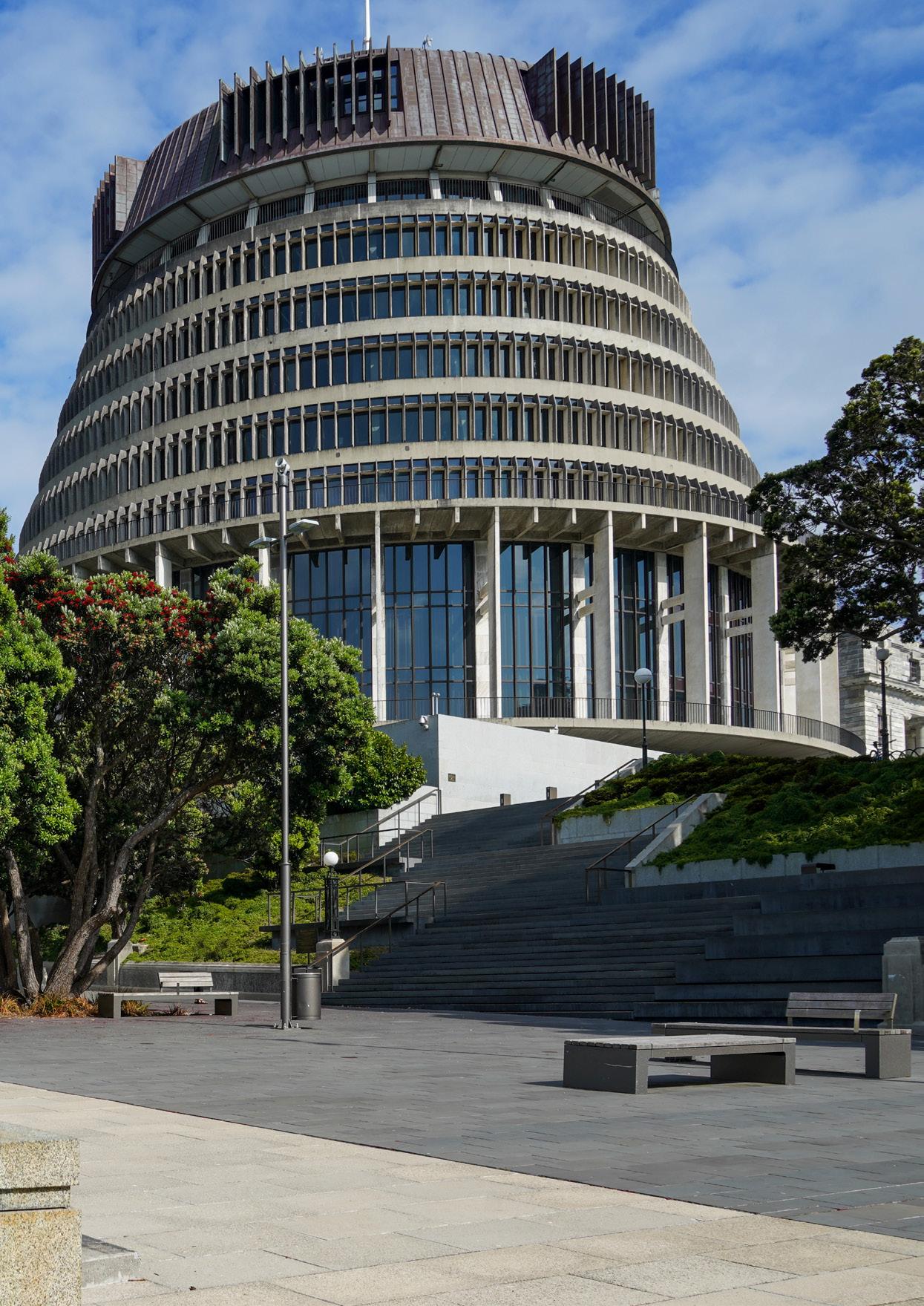
7
ACT New Zealand
The first and most important job of government is to keep its citizens safe, and ACT’s key objective in the justice portfolio is public safety. To better protect New Zealanders, ACT would work to develop cross-party support for an agreed increase in police numbers in line with population increases. This would take the politics out of police numbers so that we could focus on the quality of policing. To help victims of crime, ACT would make it the responsibility of the Crown to pay reparations to victims immediately and to recover those costs from the offender. Criminals need to face consequences, so ACT will review the use of electronic monitoring for violent offenders, bring back Three Strikes and implement a new Three Strikes law for burglaries, recognising the harm burglaries cause. ACT will also target gang finances and illegal firearms. Ending crime means tackling its causes, so ACT would require prisoners to complete skills or rehabilitation programmes before being considered for parole. ACT will fix Oranga Tamariki so that fewer young people start on the path to prison.
Aotearoa Legalise Cannabis Party
The key objective for the Aotearoa Legalise Cannabis Party (ALCP)is to end the injustice of cannabis prohibition and restore respect for law and order. Continuing to criminalise the cannabis community considering almost 50 per cent voted YES in the 2020 Cannabis Referendum, is a ‘crime against humanity’. People have suffered enough under this inhumane regime and there is no good scientific reason to pursue this expensive legal folly.
We plan to meet this objective by following the recommendations of the Law Commission Report of 2011, which stated in summary, that ‘cannabis is a health issue not a criminal matter’.
Since 1996 for the last 26 years, the ALCP has led the fight for:
1. R18 Recreational use in line with current alcohol laws. Now it is required for it to be ‘in the public interest’ before the police charge Kiwis for possession. However, Kiwis are still getting arrested with Māori statistics around four times higher than non-Māori.
2. Industrial Hemp allowed now but with limited development. This sustainable green industry will assist to curb pollution and climate extremes, at the same time as building the economy.
3. Medicinal access is allowed under certain conditions and for some medical purposes. It is unaffordable for the lower socioeconomic sector. The ALCP want to extend medical access to be affordable and accessible.
4. Our most important Key objective for justice is to expunge cannabis criminal convictions.
Green Party of Aotearoa/New Zealand
The Green Party’s vision is of communities that are safer because we have shifted the focus of our justice system to crime prevention and to the rehabilitation of those who have offended.
We know our communities are safer when everyone has access to key services and enough to make ends meet, but current approaches to justice ignore the fundamental drivers of crime and often push people further into crisis.
LAWTALK ∙ KŌ rer O MŌ T e T ure
1.
What are your party’s key objectives in the justice portfolio, and how do you plan to meet these objectives?
Aotearoa New Zealand needs a justice system that treats everyone with humanity, dignity, and respect: the Green Party will ensure communities and whānau have what they need to thrive, including mental healthcare, addiction support, affordable homes, and liveable income support. We will create meaningful alternatives to putting people in prison and support Māori leadership on justice transformation. We will address poverty and inequality so we can make everyone safer while supporting those who offend to address the root causes of their offending, to rebuild, and to live healthy, fulfilling lives.
New Conservative
New Conservatives’ main objectives are to suppress current crime and prevent developing crime.
To effectively control current offending, we must have, as a minimum, a properly functioning criminal justice system. Firstly Police must be increased in staff and funded to perform their work, focussing on faster response and safety of the community. Being on
the beat, not giving tickets, and that they are given sufficient powers. The courts and legal aid must also be properly funded. Organised crime and gangs need to be suppressed by banning gang patches, control of gangs in prison to prevent recruitment, and if required outlawing gangs as terrorist organisations.
There will be higher penalties for ram raids, and dangerous offending will not be eligible for home detention, such as firearms use, ram raids and carrying of knives. Home detention will be available for longer terms but for non-dangerous offending. Firearms abuse will be stopped.
Probation systems must be properly funded to carry out their rehabilitative tasks.
An anti-corruption board will be set up to examine complaints regarding prosecutions and Police.
No more private prisons, which waste money and are often understaffed and badly run. We will ensure a minimum level of guards per prisoner and legal access.
New Zealand Labour Party
Labour’s focus in the justice portfolio is on prevention, protection, and responsibility.
To keep New Zealanders safe, we’re ensuring that those who commit serious and violent crimes are held accountable while also providing a modern approach to rehabilitation for low-risk offenders to set them on a different path and reduce re-offending.
We want a justice system where victims are heard, and our track record demonstrates this. We have tripled the funding to the Victim Assistance Scheme and doubled the funding to Victim Support. We will also introduce legislation to give greater protections and rights to the victims of family and sexual violence.
We are committed to looking at the evidence and doing what works. For instance, our approach to youth crime reflects that intervening early and intensively is the best way to break the cycle of offending. We are also taking steps to increase
Issue 955 ∙ s pr I ng 2023
9
CONTINUED
1. What are your party’s key objectives in the justice portfolio, and how do you plan to meet these objectives?
accountability for child offenders and will establish a new criminal offence for ram-raiding.
New Zealand National Party
Our primary objectives are to reduce the number of victims of crime and to restore law and order. We drop Labour’s goal of reducing the prison population by 30 per cent, irrespective of crime levels, and by restoring real consequences for crime. Policies include restoring Three Strikes for our most serious repeat offenders, restricting the ability of judges to reduce sentences massively and giving police powers to deal effectively with gangs. To support victims of crime, we will redirect funds from the cultural reports cottage industry to provide more support for victims. To aid with rehabilitation, we will ensure programmes are available to prisoners on remand.
Second, we will combat youth offending by introducing the Young Serious Offender category, creating military academies for youth offenders, and empowering community-based organisations to supervise young offenders.
Third, we will prioritise speeding up the court processes because currently, countless lives are put on hold, waiting years for justice or a resolution to their disputes.
Fourth, in relation to electoral rights, we will restore equal voting rights at the local government level by repealing the Canterbury Regional
Council (Ngāi Tahu Representation) Act 2022, which moves away from equal voting rights and regular democratic accountability.
New Zealand Outdoors & Freedom Party

Our party is staunchly committed to a comprehensive overhaul of the justice sector, rooted in principles of affordability, accessibility, accountability, transparency, and the eradication of racism as a barrier to justice. Recognising judges’ pivotal role as the bedrock of our justice system, we are dedicated to enhancing their independence and accountability.
This resolute commitment underscores our determination to uphold the rule of law and serve the public interest. We propose instituting a fundamental duty for Crown Law employees, ensuring their allegiance to equitable, lawful, reasonable, and just decision-making grounded in established legal principles.
Furthermore, our dedication to enhancing justice’s integrity encompasses meticulously reviewing the Independent Law Society Review’s recommendations. This includes legislative changes and establishing an independent regulatory body devoid of ministerial influence. Ensuring the standards committee complaints process is overseen by retired judges, promoting impartiality and ethical standards, is equally vital. Similarly, we will closely scrutinise the Police Conduct Authority’s effectiveness, paralleling our efforts for the judiciary. To enhance police transparency and accountability, we will mandate body camera use, addressing concerns of police misconduct and fostering public trust.
This comprehensive approach encapsulates our vision for a transformed justice system that upholds fairness and equality and reflects an unwavering commitment to our society’s foundational principles.
LAWTALK ∙ KŌ rer O MŌ T e T ure
10
The Opportunities Party (TOP)
The Opportunities Party’s ultimate priority for criminal justice is reducing offending and reducing reoffending. TOP is focused on addressing the underlying drivers, including social and environmental factors that lead people into the criminal justice system in the first place. The Police, courts, and prisons, do not (and arguably are not designed to) address those drivers. TOP has a plan to tackle poverty and growing inequality, that is creating a wedge between different groups in society, where some have lost their sense of belonging and connection with their wider community and society, which is ultimately leading to a breakdown in social cohesion, manifesting in criminal behaviour.
It is ironic and frustrating to see some parties claim to be “tough on crime”, while focusing only on symptoms, and presenting no plan to tackle these wider issues (and despite the evidence that sentence lengths do not deter offending). For young people in particular, we need to give them a fair start to adult life, so they not only feel cared about by society, but are given the financial support and education to genuinely have an opportunity to fulfil their potential and feel empowered to do so. TOP’s Teal Card is discussed below.
ACT New Zealand
ACT is still developing its justice policies, and we will have more to say on this prior to the election.
Aotearoa Legalise Cannabis Party
Meeting the objectives of legalising cannabis, will obviate the need to have access to legal aid, reducing police and court time, probations, and administrative sections of the Ministry of Justice.
The unmet legal needs of the cannabis community must be addressed. This community has no protection or recourse under the current law. Justice needs to be restored to this sector who are the only community in Aotearoa New Zealand being criminalised for their beliefs. It is also unfair that the other recent social reforms as in prostitutes and homosexuals, did not have to go through a referendum, but by a parliamentary process which is where we think cannabis law reform should be heading.
The Green Party of Aotearoa/New Zealand
The law should benefit everyone equitably, but cost is currently a major barrier to accessing justice. The Green Party will extend legal aid, better resource community law centres, and make applications for protection and parenting orders free. We will centre hapū, iwi, and Māori-led solutions, acknowledging that the justice system has not met the needs of Māori communities. The Green Party will also:
· Resource and make widely available evidence-based rehabilitation, including tikanga-based restorative justice solutions.
Issue 955 ∙ s pr I ng 2023
LeFT: Aotearoa Legalise Cannabis party.
What are your party’s policies and plans in relation to access to justice, unmet legal needs and legal aid? 11
2.
CONTINUED
2. What are your party’s policies and plans in relation to access to justice, unmet legal needs and legal aid?
· Ensure that young people involved in the criminal justice system have the support they need to address the causes of their offending, including mental health and trauma support and drug and alcohol rehabilitation.
· Require regular de-escalation training for police, oppose further arming of police and the use of tactics that increase the risk of harm, and increase resources for Māori and Pasifika wardens.
New Conservative
New Conservatives will ensure sufficient funding to meet legal aid requirements.
Family Court should no longer be adversarial but inquisitorial. Lawyers should; assist and prepare, not get into constant publicly-funded paper
wars. The legal aid system will no longer be an endless pocket for family disagreements. The Family Court approach to day-to-day care will start based on shared custody, not one parent.
The Law Society will also be required to allow more direct input and delegation to the various regional branches.
Forensic mental health and probation will help with earlier recognition of problems and an increase in specialist courts such as the drugs and alcohol courts.
Increased mental health assistance and support at the courts and with follow-ups, e.g., sex-offending courses. This will extend to ensuring available rehabilitation courses in and out of prison.
Legal aid rates will be kept up to date with inflation adjustments to keep it attractive to lawyers to remain in the system. The red tape needs removal to simplify legal aid, which criminal lawyers now spend up to half their time meeting.
There will be more specialist courts, e.g. for drugs and alcohol etc.
New Zealand Labour Party
Legal aid is central to ensuring equity in New Zealand’s justice system.
New Zealand’s legal aid scheme has come under strain in recent years, with settings largely unchanged since 2011. We have taken action by:
· Increasing the income eligibility thresholds by 15 per cent, making 93,000 more people eligible for civil and family legal aid in 2023;
· Removing the legal aid user charge.
· Removing interest on repayment of unpaid legal debt.
· Increasing the debt repayment threshold by 16.5 per cent for debt established from 1 January 2023.
· Planning to increase the civil and family legal aid eligibility thresholds and debt repayment thresholds by an additional 1.9 per cent per year, with the last increase on 1 July 2025.
We will continue to ensure that access to justice is promoted for all New Zealanders. Our policies in this area will be outlined in Labour’s 2023 manifesto.
New Zealand National Party
The best way to improve access to justice is to extract better efficiency from the court processes. Many programmes are underway, but we don’t believe there has been sufficient government focus or urgency on the complex task of reducing court delays. Speeding up access to justice will be one of our three priorities in the justice sector.
We note the modest improvement to legal aid funding in the recent budget, and we will continue to adjust rates as fiscal pressures allow.
LAWTALK ∙ KŌ rer O MŌ T e T ure
12
New Zealand Outdoors & Freedom Party

Our focus on addressing access to justice and unmet legal needs remains paramount. We pledge to cultivate an equitable justice system that transcends financial barriers and dismantles racial disparities. Our approach encompasses robust enhancement of legal aid programmes, ensuring effective support is provided to individuals lacking representation resources. This endeavour seeks to empower marginalised communities, fostering inclusivity and fairness in legal proceedings while eradicating racial biases.
Furthermore, as part of our commitment to a fair and just judicial system, we will take a serious look at the Bail Amendment Act. Our intention is to return to the foundational principle of “innocent until proven guilty.” By shifting the onus back to the prosecutor rather than burdening the defendant, we aim to restore the presumption of
innocence and ensure that individuals are not unduly disadvantaged while awaiting trial. This change underscores our dedication to safeguarding individual rights and maintaining the integrity of the justice process.
Through these combined efforts, we endeavour to bridge the gap between privilege and underrepresentation, creating a society where every individual can fully participate in and benefit from a legal system rooted in fairness, equality, and the preservation of fundamental rights. This holistic approach brings us closer to a future where justice is not just an ideal but a tangible reality for all.
The Opportunities Party (TOP)
A person’s access to legal aid should not be dependent upon their relationship status, or the income or assets of their partner. Old-fashioned assumptions about how relationships work (and assumptions that a partner or spouse is willing or able to pay
for their legal fees) should not be a barrier for people to have access to legal representation. A person’s means should be based on their own individual financial position. That will inevitably mean funding for legal aid needs to be significantly expanded. Alongside such changes means the Public Defence Service will need increased funding and resources (an organisation that has long been underfunded and under-resourced as it is). Justice is expensive. But a well-functioning criminal justice system requires every defendant’s right to legal representation to be meaningful, and is critical to a well-functioning society.
Access to justice is not only about access to legal representation, but understanding the process along the way. Porirua’s Young Adult List is an excellent step forward in this regard, with the July 2021 Report showing positive results improving understanding, involvement, and accountability. This is the very type of initiative that needs to be established around the country.
Issue 955 ∙ s pr I ng 2023
13
ABOVe: new Conservative party campaign event.
3.
How would your party improve the courts and court processes?
ACT New Zealand
ACT has supported the introduction of Family Court Associates, Associate Coroners, audio-visual facilities in courts, and other measures introduced by the government to help address court backlogs.
Aotearoa Legalise Cannabis Party
Success in our goals of cannabis law reform will take cannabis criminality out of the court system. This in turn will help to unclog and free up the police, courts, and probation services, saving money and improving court efficiency and outcomes at all levels.
The Green Party of Aotearoa/New Zealand

The Green Party will prioritise rehabilitation by reforming the justice system to ensure that legal proceedings do not re-traumatise victims and survivors. We will
expand specialist youth courts (e.g. the Rangatahi and Pasifika Courts throughout Aotearoa), minimise the use of remand in youth detention facilities, and reform bail and sentencing laws to allow for more non-custodial community outcomes. We will further improve courts and court processes by:
· Properly resourcing the courts to reduce average wait times.
· Advocating for the use of plain language in court procedures.
· Adequately funding jury participation so that juries represent their local communities.
· Removing court fees to ensure everyone can access justice.
· Widening the use of online court systems.
New Conservative
More funding, properly applied. There has been a serious increasing systemic shortage of judges, court time, and staffing. Justice delayed is
LAWTALK ∙ KŌ rer O MŌ T e T ure
justice denied, and also punishment and rehabilitation delayed–proper funding and increasing of staff to ensure resources for the judicial and legal systems. More funding for probation and courses will allow rehabilitation to work properly. Legal aid will need to be increased also as we have a serious shortage, especially in the Family Court.
The Police must also be independent and not prosecute to prevent bias. All prosecutions should be by the Crown and a new prosecution branch for lesser offending. Reduce unnecessarily time-consuming requirements.
We need to speed up the legal process; it used to be weeks for family violence matters, but it is now months or years.
The courts will look at more dismissals of prosecutions for excessive delay. Bail breaches should be dealt with by short terms of imprisonment, not lengthy remands in custody for minor offending.
Improve access for prisoners to programmes. Increase education/ trades pre-training in prisons. Lawyers’ access to clients in prison must be properly extended.
New Zealand Labour Party
In Budget 2022, we committed three years’ worth of funding for justice sector initiatives, including work programmes aimed at improving our courts and court processes.
We acknowledge that there has been an increase in delays in the court system as a result of various factors. These delays have been frustrating for parties, lawyers, and court staff alike.
The existing paper-based system run by our courts is antiquated and does not link electronically to judges, counsel, or parties. We have embarked upon a project to digitise court practices, which is currently in procurement and will vastly improve the efficiency of the courts in the long term.
In the meantime, we have committed funding for the courts to employ additional judges and administrative staff. We also recently announced a boost to funding for Police prosecutions, which will cover an extra 44 staff focused on in-court work and a further 41 staff in key support roles.
Our policies in this area will be outlined in Labour’s 2023 manifesto.
New Zealand National Party
Kiwis are being denied access to justice by massive delays in our courts and tribunals systems. While COVID-19 and severe weather events did exacerbate longstanding issues, we’ve seen a lack of urgency,
imagination and determination on the part of the government to reform the system.
National will improve the court experience for all users by ensuring technology is used more effectively to resolve disputes quickly. Audiovisual links will be utilised much more than is currently the case. Some of the necessary legislative frameworks are already available through the Courts (Remote Participation) Act 2010 and temporary tools provided during the covid19 period.
We will balance this need for administrative efficiency and accessibility with the dictates of natural justice. For example, jury trials and/or criminal trials involving a potential sentence of imprisonment will still take place in person.
By using technology more freely and making other reforms (such as extending the hours of courts’ and tribunals’ operation), National will improve access to justice for every Kiwi using our courts.
New Zealand Outdoors & Freedom Party
Our approach encompasses enhancing legal aid programmes to ensure effective support for individuals lacking resources for representation. This endeavour aims to empower marginalised communities, fostering inclusivity and fairness in legal proceedings while eradicating racial biases.
To foster a just society, our party is steadfast in modernising court processes. We propose a transformative reform: mandating the recording of all court proceedings and providing accessible transcripts. This initiative amplifies accountability, accuracy, and the review process while striving to eliminate racial
Issue 955 ∙ s pr I ng 2023
15
LeFT: prime Minister of new Zealand, Leader of the Labour party and Mp for remutaka, rt Hon Chris Hipkins meeting supporters.
biases. By harnessing technological advancements, we aim to streamline proceedings, minimise delays, and bolster public confidence in an equitable and unbiased justice system. Our dedication to holistic justice reform signifies our unwavering commitment to bridging the divide between privilege and underrepresentation. We champion not only a just and fair proceedings but also emphasise the utmost importance of judicial independence and accountability. Recognising the need for oversight, our party will review and fortify the Office of the Judicial Conduct Commissioner, ensuring
fair hearings for every individual, regardless of background. These comprehensive efforts pave the way for a society where justice is genuinely accessible and fair for all, epitomising our democratic foundation’s core values.
The Opportunities Party (TOP)
Specialist courts that target underlying dependency issues have seen excellent results in reducing offending. The Alcohol and Other Drug Treatment Court (AODT) has achieved an overall reduction of 28 per cent over the first three years post sentence, and a 27 per cent lower imprisonment rate. Longer-term support for graduates is needed to ensure longer-lasting success. The cost-benefit ratio found the benefits to outweigh the costs (at 1.33). In light
of these results, this model should be implemented around the country. ten years plus into this programme, and it is still only in Auckland and Hamilton! TOP calls for this model to be rolled out nationally.
TOP also supports efforts in recent years that focus on improving the experience of going through court for victims. However more work needs to be done, particularly to address long-term impacts many victims experience in the weeks, months and years after the Court case is over. The ongoing specialist support service offered to families in cases of homicide long after the case has finished is an essential service that needs to be made available for families and victims of other crimes (including the 30 sessions of specialist counselling), particularly for victims of sexual violence.

LAWTALK ∙ KŌ rer O MŌ T e T ure
CONTINUED
3. How would your party improve the courts and court processes?
16
rIgHT: Leader of the national party and Mp for Botany, Christopher Luxon.
4.
What are your party’s immediate legislative priorities for the first year of the parliamentary term?
ACT New Zealand
Most New Zealanders think the country is on the wrong track, and many are voting with their feet and leaving. We need to change that. ACT is determined to turn things around fast and bring real, positive change to New Zealand. To deliver that change in the first year, ACT wants to:
· Establish a Minister for Regulation to reduce the regulatory burden on business.
· Cut wasteful government spending, for example, by disestablishing unnecessary ministries.
· Replace the complex and restrictive Natural and Built Environment Act and Spatial Planning Act with separate Environmental and Urban Development Acts.
· Repeal the Zero Carbon Act and reject the Climate Change Commission’s recommendations.
· Repeal Three Waters.
· Disestablish the Māori Health Authority.
· Restore mortgage interest deductibility for rental properties.
· Bring back 90-day trials.
· Bring back three strikes.
· Bring back charter schools.
· Get rid of so-called Fair Pay Agreements.
· Repeal Section 7AA of the Oranga Tamariki Act 1989.
· Cut the 30 per cent tax rate to 17.5 per cent.
· Cut the 39 per cent tax rate to 33 per cent.
· Repeal the ban on new offshore oil and gas exploration permits.
· Exempt investors from OECD countries from the need to receive Overseas Investment Office approval to invest here.
Aotearoa Legalise Cannabis Party
Legalising cannabis will be our immediate legislative priority and to expunge all cannabis convictions. By ending cannabis prohibition and the black market it has created,
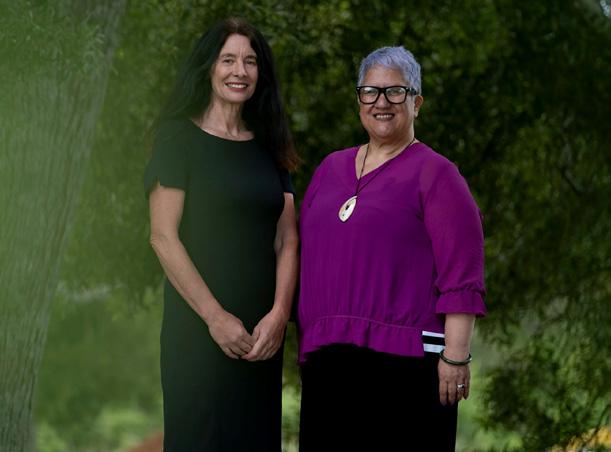
Issue 955 ∙ s pr I ng 2023
ABOVe: new Zealand Outdoors and Freedom party CoLeaders sue grey and Donna pokere-phillips.
17
CONTINUED
4. What are your party’s immediate legislative priorities for the first year of the parliamentary term?
we will help reduce the chaos and dysfunction we now see, resulting from distrust of the system.
Our policy will end the current regime wasting millions of dollars in futile pursuit of ordinary citizens the majority (80 per cent) of whom have broken the current laws on cannabis.
The Aotearoa Legalisation policy is about saving the taxpayers’ dollars. The development of the three sustainable planks of Recreational, Medicinal and Hemp Industries will bring untapped wealth to the New Zealand economy while contributing to saving the environment. A winning result.
The Green Party of Aotearoa/New Zealand
Our priority always is to support people, nature, and climate to thrive. More Green MPs around the decision-making table mean that we can truly shape the direction of the next government: a government that will take bold action to build a cleaner, fairer future for all of us, where all of our energy needs are met by clean power; where the land has healed, and wildlife thrives; and where everyone has a liveable income and an affordable home to make their own – all paid for with a fair tax system.
We have made a Pledge to Renters that in the first 100 days of a new government, we will introduce a Renters’ Rights Bill to ensure everyone who rents has a safe,
healthy and affordable place to call home: www.greens.org.nz/our_pledge_ to_renters
Our key objectives and legislative priorities are set out in full in the 2023 Manifesto; The Time is Now: www.greens.org.nz/manifesto_2023.

New Conservative
The 5 per cent threshold for elections will be lowered to 3.5 per cent.
We will make the Bill of Rights supreme law and entrench it to control the unbridled power of parliament.
Develop a recommendation committee for criminal law changes to ensure that there is proper legal consideration for the consequences of legal changes. Parliament cannot just have knee-jerk reactions and remove defences that arose over hundreds of years.
New laws dealing with gangs and dangerous crime, especially gang wars/strife, the safety of the community etc. Control of firearms and knives. Crackdown on fad offending, like ram raids.
Laws to increase legal aid and legal aid rates.
Work on strengthening family involvement, rehabilitation and early intervention, especially for at-risk youth.
New Zealand Labour Party
In the justice portfolio, our immediate legislative priority for the next parliamentary term is to enact changes we announced in July 2023 to reduce youth offending. These changes include a new criminal offence targeting ram raid offending, an aggravating factor in sentencing
LAWTALK ∙ KŌ rer O MŌ T e T ure
18
for posting offending behaviour online, and an aggravating factor where an adult uses a young person to commit a crime.
Labour’s 2023 manifesto will detail the remainder of our legislative priorities.
New Zealand National Party
National will publish a 100-day plan before the election, which will include a range of important commitments. Before Christmas, we have committed to repealing the government’s Resource Management Act reforms in its entirety and repealing the Three Waters legislation within 100 days. Further announcements will be made in due course. There is a lot of work to do to turn this country around.

New Zealand Outdoors & Freedom Party
In our pivotal first year, we will prioritise fundamental rights, transparent governance, and comprehensive justice reform. Eradicating racial barriers is paramount. We’ll revoke the COVID-19 Public Health Response Act 2020 and fortify the New Zealand Bill of Rights 1990 for enforcement. Balancing prudence, we’ll limit emergency powers, safeguard human rights, and combat systemic racism. Strategic budget allocation will incentivise crime reduction, ensuring equitable resourcing of disadvantaged communities. Our commitment extends to reviewing the Bail Amendment Act 2013 and restoring the presumption of innocence.
In line with our focus on equitable justice, we’ll rigorously examine the Independent Law Society Review’s proposals and establish a regulatory body. Alongside this, the standards committees will be manned by retired judges, ensuring impartiality and ethical standards. To enhance police accountability and transparency, we’ll strengthen the Police Conduct Authority. Recognising the need for oversight, we’ll review and reinforce the Judicial Conduct Commissioner.
These actions, coupled with reinforcing judicial independence, underscore our dedication to individual liberties, responsible governance, and an equitable society. Our
inaugural year focus ensures justice for every New Zealander.
The Opportunities Party (TOP)
The Opportunities Party wants to bring fresh thinking, smart ideas and political courage to Parliament, to deliver fairer and more sustainable outcomes. TOP’s Teal Card is part of our plan for real change. It is a way to invest in our young people, to ensure financial equity and healthier outcomes for all our children, in a way that provides young people with a genuine fair start to adult life.
The Teal Card would provide all young people under 30 with fully-funded healthcare (including GP visits, dentist, optometrist, and mental health support) to ensure they have access to primary care, at a time in their life when we know young people struggle the most financially.
The Teal Card would also provide fully-funded public transport, with a grant for electric bikes or scooters. Alongside a savings boost for all who choose to take part in a national civics education programme, which can open the door for training or studies, or helping to get into a rental to live independently.
This is how we can give young people a fair start in life. It is a step up. It will provide hope, and it is the right thing to do. ▪
Issue 955 ∙ s pr I ng 2023
LeFT: Leader of The Opportunities party, raf Manji.
19
A clearer, fairer, more accessible democracy
Independent Electoral Review seeks to future-proof New Zealand’s electoral system
New Zealand’s electoral system needs a revamp, the Panel undertaking the Independent Electoral Review says, in order to be fit to respond to the challenges of the 21st century.

In May 2022 a panel of independent experts was appointed by the Minister of Justice, tasked with undertaking the Independent Electoral Review – He Arotake Pōtitanga Motuhake, a comprehensive review of New Zealand’s electoral system. After seeking widespread input from the public and receiving over 1,700 written submissions, the Independent Panel released its Interim Report of draft recommendations in June 2023, followed by a subsequent round of engagement. The Panel will present its final report to the Minister by the end of November this year.
“It’s wise to look at the things that are key to our democracy afresh now and then”, says Panel Chair Deborah Hart, with the Panel’s ‘warrant of fitness check’ on New Zealand’s electoral system revealing that a number of our current processes and laws may need modernising to ensure they are fit for purpose, now and in the future. Change is
necessary, Hart asserts, to “ensure that we meet the challenges that we see, and future-proof our electoral system for future challenges that perhaps we can’t see quite yet.”
The Electoral Act
Our electoral system has been built on foundations that are now outdated, says the Panel, and hence electoral reform needs to start with the bones of the system itself – the Electoral Act. The Electoral Act 1993 needs to be “thoroughly redrafted”, according to the Interim Report, in particular by modernising its language, structure and content to make it easier to understand and implement. The language used in provisions such as those relating to mental health and disabilities is archaic, with the Panel stating that an overhaul of the Act is required to bring it into the 21st century. “There’s outdated language, and the basic framework hasn’t changed in over 60 years”, comments Hart. “Those kinds of things are problematic.”
A demand for transparency
Not only is the Act outdated in language, in the Panel’s view, but it is currently unfit to respond to the
LAWTALK ∙ KŌ rer O MŌ T e T ure
“Change is necessary, Hart asserts, to “ensure that we meet the challenges that we see, and futureproof our electoral system for future challenges that perhaps we can’t see quite yet”
20
rIgHT: Deborah Hart, panel Chair.
challenges of the modern world. One of the most pertinent of these challenges is the potential impact of mis- and dis-information on the integrity of the electoral system.
“We hear a lot about mis- and dis-information”, says Hart, with there being a need to introduce greater safeguards in the electoral sphere to ensure that our system remains open and accountable. One of the ways to do this, Hart and the Panel have suggested, is to broaden the scope of already-existing offences in the Electoral Act.
“We already have an offence of knowingly publishing false statements with the intention to influence voters. Currently it’s an offence in the two days leading up to voting and on election day, however around 70 per cent of New Zealanders are voting ahead of polling day. We are therefore suggesting extending the period in which the offence would be operative so that it covers the time for advance voting, as well as election day.”
Increasing funding for community-led initiatives around civic education should also be prioritised, says the Panel, to ensure that educational resources are readily available to all sectors of the community.

Protecting the credibility of the information consumed by voters isn’t the only issue regarding transparency that needs to be tackled. Political financing is also a space where the Panel says there is a profound lack of trust amongst the public. The existing rules around funding need “tightening”, according to the Interim Report, to ensure private actors aren’t able to hold the purse strings of our democracy.
“One of the things that we know from research is that public trust in the way that political parties are funded is low. Research also suggests donors making large donations may expect to have greater influence or access to politicians”, says Hart. “Even that perception that some people have more access or influence over our elected representatives has the potential to cause harm to our electoral system and our confidence in our electoral system.”
In response to these concerns, the Panel has proposed a package of draft recommendations around political financing to control the amounts that deep-pocketed players can contribute to the resourcing of political parties and their electoral campaigns. The Panel has suggested
that donations to political parties and candidates be limited only to individuals who are on the electoral roll, meaning that all entities –whether trusts, companies, trade unions, iwi, hapū, or unincorporated societies – would be prohibited from making donations. The draft recommendations also propose that an individual’s donations be capped at $30,000 per party and its candidates for each electoral cycle, and that the threshold for anonymous donations be reduced from the current $1,500 to $500. Disclosure thresholds should also be lowered, recommends the Panel, and weekly disclosure of the names of donors who make large donations mandated in the three months leading up to election day.
“As a package, our proposals are designed to improve transparency, increase public trust in funding, and reduce the potential for disproportionate influence”, says Hart. How these recommendations butt up against the right to freedom of expression may, however, prove problematic, with the New Zealand Bill of Rights Act 1990 being applicable to all legal persons, including entities, and political donations being expressive acts protected by
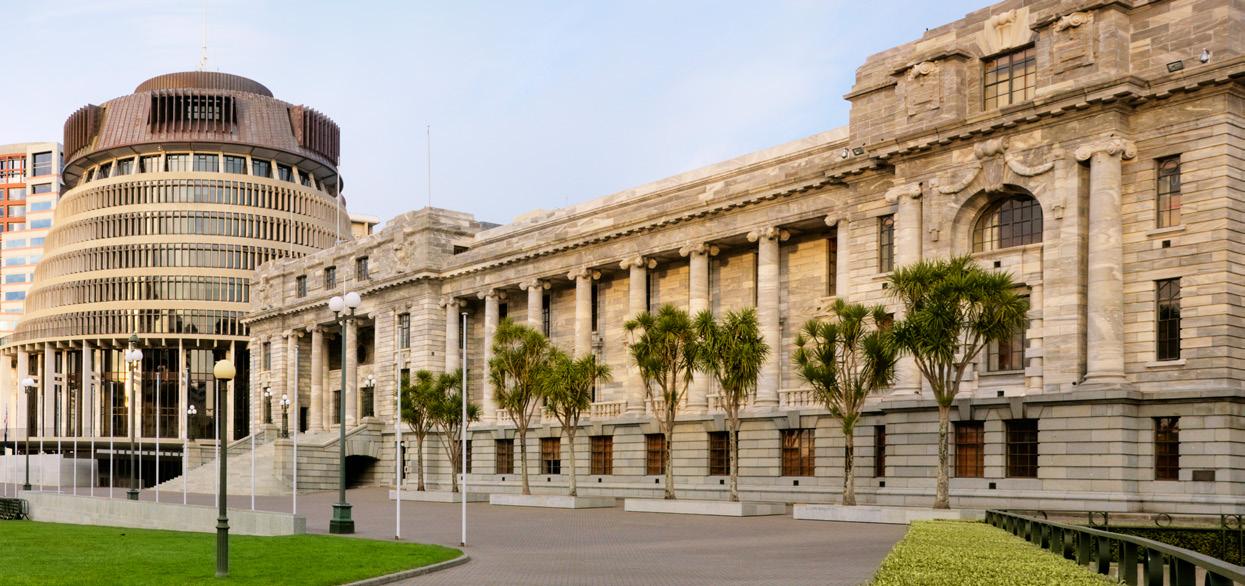
21
section 14. There is also concern that this may inadvertently quell the input of groups like iwi, hapū and voluntary organisations, who would no longer be able to contribute to a political party or candidate’s cause. These issues have been highlighted by the New Zealand Law Society Te Kāhui Ture o Aotearoa in its submission on the draft recommendations, and reconciling these tensions will no doubt form part of the Panel’s discussions as it looks toward crafting its final report.
Broadening the voting pool
Voting is a fundamental right, Hart says, and more New Zealanders need to be empowered to participate in the electoral system. New Zealand’s voting eligibility criteria are unduly restrictive in the contemporary age, says the Panel, which considers that there is now justification to welcome to the polling booths groups not previously extended the right to vote.
One such group is sixteen and seventeen-year-olds, with the Panel’s draft recommendations supporting lowering New Zealand’s voting age to sixteen years of age. “The Bill of Rights affirms the right of citizens aged eighteen years and older to vote, but it also guarantees the right to be free from age discrimination”, Hart notes. “We looked to whether there was a cause to limit that right for sixteen-year-olds, keeping in mind the principle that we had of trying to encourage participation, and, based on what we saw, we think sixteen-year-olds are just as
capable of voting as eighteen-yearolds.”
“Overseas there seems to be at least some kind of move to lower the voting age in countries that we like to compare ourselves with. Several countries, Scotland, Wales and Germany, for instance, have either changed the age of voting to sixteen, or are considering it at the moment.”
That particular line of argument might, however, prove problematic for the Panel to defend, given that both Wales and Scotland are uniquely situated as part of the wider United Kingdom political union. Given that these are technically regional parliaments, subject to the overarching United Kingdom Parliament, the comparison to New Zealand’s situation arguably cannot quite be claimed. Similarly, in Germany the voting age for federal elections remains at eighteen years old, with the right only being extended to sixteen and seventeen-year-olds for European Parliament elections and local elections in select German states.
Perhaps less controversially, the Panel has also suggested increasing the voting pool by allowing expat Kiwis to retain the right to vote in New Zealand elections for up to two electoral cycles after having left the country, as opposed to the current single cycle cut-off. Kiwis who fly the nest are notorious for boomeranging back again, and modern technology enables us to stay connected in more ways than ever before. Our digitalised, globalised
reality means that Kiwi globetrotters can still stay on the pulse of issues back home – issues which would inevitably affect them upon any future return. “We think that the rule is now too restrictive, given the ways that people can stay connected from abroad now”, says Hart. “[The current position] may be unfair to those people whose circumstances just don’t allow them to come home so regularly”, she adds, “so we’ve recommended that we extend the time that you can be away to two electoral cycles. We think that will encourage participation, and be a lot fairer as well.”
Finding a way forward
With other issues tackled by the Review including lowering the party vote threshold, introducing a new power to reconvene a dissolved or expired Parliament, and the prospect of a public referendum on extending the parliamentary term, there has been no shortage of things to discuss at the Panel table. It is clear that modernisation is front of mind in respect of the Panel’s draft recommendations, and indeed any electoral system must be fit for the population it serves. However, anything that touches a constitutional nerve will inevitably be a sensitive matter, and it may prove difficult to shift the dial on ideas that are so engrained. Submitters have now had the opportunity to have their say regarding the draft recommendations, and will no doubt await the release of the final report in November with anticipation. ▪
LAWTALK ∙ KŌ rer O MŌ T e T ure
22
Supporting the legal profession since
1869
The Law Society Te Kahui Ture o Aotearoa is the kaitiaki of the legal profession. For our representative services that means we combine our 152-year history of trust and credibility with our national reach, bringing together industry experts, thought leaders, and practitioners from across the profession in an environment of collaboration, learning, and innovation.
Find out more at lawsociety.org.nz/membership

Law Society response to Independent Review
In its response to the Independent Review, the Law Society has accepted in principle most of the recommendations, including recommendations to establish a new independent regulator and an overhaul of the system for handling complaints about lawyers. The Law Society’s response was developed after consultation with its Council members and the profession. Some recommendations – for example developing a new freelance practising model or permitting new business structures – were earmarked for further consideration. No recommendations were rejected.
The response has been provided to the Minister of Justice, so that it can be considered for the Government’s legislative agenda.
Dual role an international outlier
Published in March 2023, the Review said that the Law Society’s current structure encompassing both regulator and membership body was an outlier in comparison with other legal regulatory systems internationally. “Many believe this current dual role doesn’t serve the interests of the public or the profession well”, Law Society President Frazer Barton said.
Some lawyers hesitant to access health and wellbeing services
The Review acknowledged that having the representative body and the regulator in one organisation could potentially deter lawyers from discussing concerns or seeking assistance from the Law Society. The Law Society is aware that its regulatory functions can act as a deterrent to lawyers accessing its representative services.
“There can be particular difficulties in responding to health and wellbeing concerns raised by practitioners”, Chief Executive Katie Rusbatch said. “As New Zealand’s population ages, an increasing cohort of lawyers are facing health issues which have varying degrees of impact on their law practices. Many of these practitioners require support.”
Independence from government
Mr Barton said that if a regulator is established, it should not be a Crown entity. “The new regulator would be established as an independent statutory body. It would not be subject to directive powers or statements of policy from government.”
LAWTALK ∙ KŌ rer O MŌ T e T ure
24
“The Law Society has accepted in principle most of the recommendations, including recommendations to establish a new independent regulator and an overhaul of the system for handling complaints about lawyers”
Te Tiriti o Waitangi
Other recommendations accepted in principle include that a Te Tiriti clause should apply to those exercising regulatory functions under that legislation. Further work is required to determine the appropriate language for that clause and how it would operate in practice.
This particular recommendation from the Independent Review Panel generated some commentary earlier in the year. It’s important to note that the proposed recommendation applies to a new regulator, and not to lawyers or the duties they have.
Freelancing proposal requires further consideration
A recommendation to introduce a new ‘freelance’ practising model needed further consideration, the Law Society noted in its response. The freelance model would allow lawyers to provide services to the public in non-reserved areas without requiring prior regulatory approval.
Currently lawyers who wish to practise on own account need at least three years of legal experience, and to satisfy the Law Society of their suitability. These requirements provide an important quality assurance safeguard for lawyers who are offering unsupervised services to consumers.
“Practitioners who are approved to practise on own account are overrepresented in complaints statistics compared with their proportion of the practising population”, Ms Rusbatch said. In the year to 30 June 2022, 72% of closed complaints handled by the Law Society were about directors, partners, sole practitioners,
or barristers, but those individuals make up approximately 35% of the population of the legal profession.
The Review recommendation was based on the model adopted in England and Wales. The Law Society advised that care should be taken before relying on this experience, as the reserved areas in England and Wales are broader than in New Zealand.
“If the freelance model were adopted here, it would be available to a wider range of practitioners than in England and Wales”, Ms Rusbatch said.
The impact of a split
If the Law Society was effectively split into two, Mr Barton noted that the representative arm remains best placed to act as the national body representing lawyers. “We have established systems and services that support the profession by way of regular bulletins, regular engagement, mentoring and counselling services, to name just a few.”
The Law Society is also the only representative body providing extensive geographical support through 13 branches across the motu, from Tāmaki Makaurau right down to Southland.
“As our recent advocacy supporting lawyer wellbeing and duty lawyer remuneration shows, the Law Society is a strong voice that other organisations reach out to, listen to, and collaborate with.
“It’s important for the Law Society to retain a strong representative function and act as an advocate for principles such as access to justice”, he said. Separation of the
representative function from the regulatory function will likely enable the representative body to have a stronger voice in support of lawyers.
Currently, there is no timeframe for any proposed split, as legislative change is required. The Law Society is looking to government to indicate whether reform will be a legislative priority, so that further work can be undertaken to progress the required changes.
Taking account of a range of views
During all stages of the Independent Review there was considerable opportunity for the profession to engage, and a range of views expressed. To ensure the response was transparent, the Law Society published the Council responses for each recommendation, and also the indicative support from the profession.
However, if new draft legislation eventuates, there will be further opportunities for the Law Society and individual lawyers to comment on the Bill through standard policy and legislative development processes.
“Whether you agree or not with the Independent Review recommendations, it has started the conversation on the long-term future of the Law Society, how the profession is regulated, and what it means to be practising lawyer today”, Mr Barton said.
“We’ve invested a lot of time and resources into consultation on both the Review and the Law Society’s response – and at this point we have to come to a decision and make recommendations to government to allow us to move forward.” ▪
Issue 955 ∙ s pr I ng 2023
25
# Theme/recommendation Response
1 Independent regulator establish a new independent regulator to regulate lawyers in Aotearoa new Zealand.
2 Institutional arrangements
ensure the independence and effectiveness of the new regulator by institutional arrangements that include:
a) establishing an independent statutory body, which is not a Crown entity and not subject to direction from Ministers.
b) a board of eight members, with an equal split between lawyer and public members, chaired by a public member, and at least two members with strong Te ao Māori insights.
c) appointment of board members by the Minister of Justice, following advice from a nominations panel comprising a mix of consumer representatives, governance experts and members of the legal profession.
3 New statutory objectives and obligations

Incorporate Te Tiriti and regulatory objectives in the new Act and update the fundamental obligations of lawyers, by:
a) including a Tiriti o Waitangi section, requiring those exercising powers and performing functions and duties to give effect to the principles of Te Tiriti o Waitangi.
b) setting out regulatory objectives, with an overarching objective to protect and promote the public interest.
c) updating the fundamental obligations of lawyers, requiring lawyers to promote as well as protect their clients’ interests and adding a new obligation on lawyers to maintain their competence and fitness to practise.
4 Scope of regulation
reform the scope of regulation, by:
a) maintaining the current focus of the regulatory framework on lawyers and conveyancers, rather than extending it to cover other unregulated legal service providers.
b) introducing a new ‘freelance’ practising model that allows lawyers to provide services to the public in non-reserved areas, without requiring prior approval from the regulator.
c) permitting employed lawyers to provide pro bono services to the public in non-reserved areas.
d) permitting new business structures, to allow non-lawyers to have an ownership interest in law firms and lawyers to enter into legal partnerships with non-lawyers.
e) directly regulating law firms, with new firm-level obligations.
Accept in principle
Accept in principle
Further consideration required
Further consideration required
Accept in principle
Accept in principle
Accept in principle
Accept in principle
Accept
Further consideration required
Accept in principle
Further consideration required
Accept in principle
26
5 Quality assurance and care enable the regulator to better protect consumers, support practitioners and assure competence, by:
a) giving the regulator new tools, including powers to suspend practising certificates, require practitioners to undergo a health or competence review, undertake practice reviews and impose bespoke conditions on a practising certificate.
b) reviewing CpD requirements including the current 10-hour CpD requirement, and specifying key mandatory components of the CpD to be undertaken every three to five years.
6 Complaints system
reform the system for handling complaints about lawyers and introduce a model in which:
a) complaints will be assessed and determined by in-house specialist staff, rather than by volunteers on standards Committees.
b) formal investigative and disciplinary processes will be reserved for those matters that require a disciplinary response from the regulator. Complaints about ‘consumer matters’ (eg, fees, delay, poor communication) will instead go through a dispute resolution process.
c) the identity of a lawyer who engages in ‘unsatisfactory conduct’ will not be publicly disclosed other than in exceptional circumstances, with naming reserved for cases where the Lawyers and Conveyancers Disciplinary Tribunal finds the lawyer guilty of ‘misconduct’.
d) The independent Legal Complaints review Officer will be replaced by a small review committee convened by the regulator and staffed by external members or an external adjudicator.
e) lawyers will be subject to a new duty to ensure complaints are dealt with promptly, fairly, and free of charge.
7 Cultural challenges encourage diversity and inclusion in the legal profession, by:

a) creating a regulator with a specific objective of “encouraging an independent, strong, diverse and effective legal profession” and a competence-based board that reflects diversity.
b) removing regulatory barriers that are having a discriminatory effect.
c) giving the regulator new powers to collect diversity data from law firms and publish aggregate data on trends within the profession.
8 Law Society as a membership body
The Law society should continue as the national representative body. It should have a single governance layer, with a board comprising 8-10 members, including public members.
Accept in principle
Accept in principle
Further consideration required
Accept in principle
Accept in principle
Further consideration required
Accept in principle
Accept in principle
Accept in principle
Accept in principle
Further consideration required
# Theme/recommendation
Response
27
Making risk-informed decisions to combat the cost of natural hazards
Six-months on from the extreme weather events that marked the start of 2023, New Zealand is facing unprecedented costs associated with natural hazards and extreme weather events. While New Zealand’s recent experience represents only a fraction of the impacts of natural hazards on a global scale, a small economy like New Zealand’s is especially sensitive to the financial and social costs of these events.
Property law research becomes more tort focused
Since the severe weather events of early 2023, Bronwyn McGee, one of the Law Society Library’s Legal Researchers has noticed an increase in the number of property-related research requests and that the subject matter of the research has becomes more tort focused.
“Normally most of the property research we do relates to neighbour or conveyancing disputes. After the Auckland flooding and Cyclone Gabrielle this year, we had a lot of research requests focusing on negligence, nuisance, the duty of care and liabilities of territorial authorities. There is also significant research on commercial lease disputes over whether a property has become
untenantable and whether the tenant can cancel the lease for that reason.
“A similar spike occurred after the Canterbury and Wellington earthquakes. We did a lot of research for South Island based firms on insurance policies, reinsurance, exclusion clauses, and the assignment of insurance claims when the property was damaged after a sale but prior to settlement”, Bronwyn says.
Reducing the cost of natural hazards
Probabilistic modelling of potential losses to built environment assets from natural hazards paints a dire reality facing the nation if the status quo continues.
Dr Jo Horrocks, Chief Resilience & Research Officer at Toka Tū Ake EQC, says that loss modelling sends a clear signal that New Zealand cannot sustain the significant costs of ongoing hazard events.

“The estimated cost of 1.2 billion, scarily enough, is just the direct costs of asset damage – repair or replacement.
“What we still need to add into the equation are the indirect and intangible costs, including the flow-on
LAWTALK ∙ KŌ rer O MŌ T e T ure
28
nZ Herald/george Heard
effects to the rest of the economy and the economic cost of social impact. The Canterbury earthquake sequence has proved that the figure can double or triple the direct costs. If we add in a few other cost buckets, particularly around the cost of maintaining reinsurance, we should be thinking about a much larger number as our annual cost of natural hazards in this country.”
The unintended consequences of the rapid housing development

Although natural hazards can seem unpredictable and unavoidable, it is evident that we can prevent some of the consequences of natural hazards

Issue 955 ∙ s pr I ng 2023
LeFT: Aerial photographs show the extent of damage caused by a landslip at Muriwai.
29
BeLOW: Dr Jo Horrocks, Chief resilience & research Officer at Toka Tū Ake eQC.
About the Law Society Library Legal Research Centres
The Law society operates three main libraries with research centres as well as unstaffed branch libraries in District Courts around the country. The Law Libraries provide document delivery and research services to Law society members.
The legal research librarians conduct research on every practice area. The common research requests are criminal, and family based, and others include employment disputes, companies, ACC, civil procedure, trusts and wills. For more information, visit lawsociety.org.nz/ professional-practice/lawlibrary/
by making risk-informed choices about our property and land.
Dr Horrocks provides an example above that shows a large expansion of a suburb subdivision in Awatoto, South Napier, from 2012 to 2020, and a flood hazard mapping from 2016 predicted where flooding might occur. Poignantly, those new buildings were flooded by Cyclone Gabrielle in February this year.
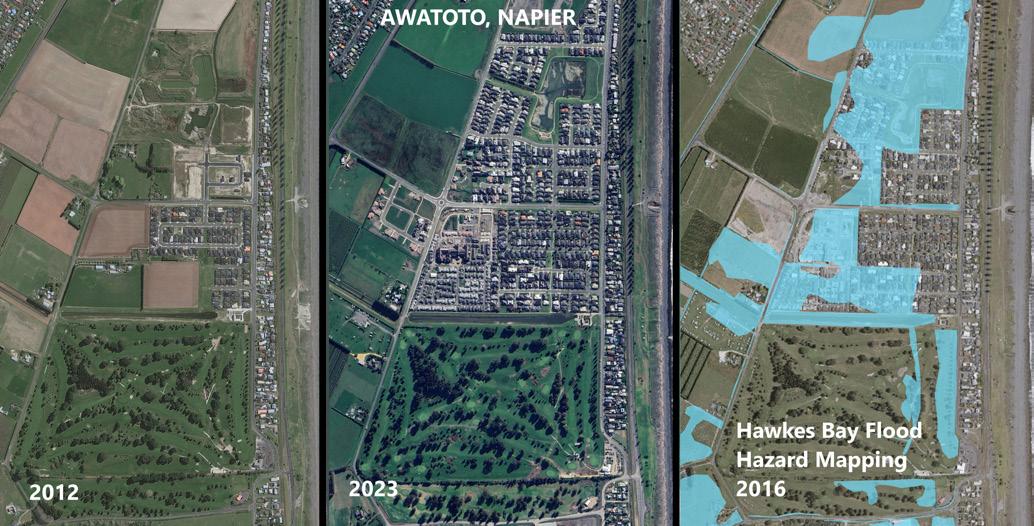
“We know that development is badly needed but unfortunately, we’ve seen some really ill-advised decisions with properties moving far too quickly from construction through to an insurance claim.”
An online platform that facilitates more equitable sharing of information
Toka Tū Ake EQC has recently launched the Natural Hazards Portal – an online, standalone, free-to-access natural hazard risk information site with geospatial functionality, that allows users to access previous, settled Toka Tū Ake
EQC claims information at property and aggregated levels.
“We know that sharing of hazard risk information leads to better risk management generally. It enables better risk-based decisions, and more reliable readiness, response, and recovery mechanisms.
“The Natural Hazards Portal allows us to leverage our investment in natural hazards research and science and use the data we have to tell us more about natural hazard risk and the ways that we can reduce that risk.
“Ideally, we’d like to take people on a journey from natural hazard awareness and what that means for property and, communities through to a discussion about their risk and their tolerances to those risks.”
Another tool in the property lawyers’ toolkit
Christchurch based property law specialists, Mortlock McCormack Law partner Hamish Douch and Associate Jamie Stanton see the Natural Hazards Portal as offering
LAWTALK ∙ KŌ rer O MŌ T e T ure
30
LeFT: The image was developed from publicly available information and shows the intensification of residential development, over ten years, in a known, modelled hazard zone (flooding).
a “one-stop shop” for prospective property purchasers to find out about natural hazards and possible EQC claims. The firm is already drawing their clients’ attention to the portal in their reporting notes.
Hamish, who’s also a member of the Law Society’s Property Law Section Executive Committee, sees the portal’s functionality evolving into a central repository for information on properties and locations. Likewise, climate mapping and interfaces with hazards such as overland flow paths and flood zones will assist with a more forward-looking approach to identifying and assessing property risks.
From a legal point of view, Jamie says the current LIM documentation takes precedence with respect to legal due diligence on properties. However, further information, and especially when packaged in user friendly technology such as the Natural Hazards Portal is a great tool for clients and is a welcome contribution to the overall due diligence process.
Address privacy concerns and stigma on claims
Privacy and the potential for stigmatising properties with claims were key considerations in the development of the portal. “Essentially, the information on the portal was already publicly available. We have just made the experience of finding it and making it available in one place a lot easier”, says Dr Horrocks.
“We also do not want to stigmatise claims. Claims do not need to be a bad thing, but rather a signal to
investigate more. Many of the claims that Toka Tū Ake EQC receives are relatively minor.
“To prove that the information is safe and secure, we went through an extensive privacy assessment to ensure the information storage and transfer couldn’t be abused.”
Work continues to advance the portal
The long-term goal for the portal is to provide a comprehensive view of natural hazard risk that can be seen at a property level all the way through to a national level. Further development is ongoing to integrate the portal with hazard maps and modelling data. ▪
About the Natural Hazards Portal
The natural Hazards portal is a government initiative led by Toka Tū Ake eQC, to enable users to explore Aotearoa new Zealand’s natural hazard risk and how it may impact them. The first release, in July 2023, gives users the ability to geospatially view the Toka Tū Ake natural hazard claims data to better understand previous natural hazard events in specific areas.
· The claims on the portal are all valid, settled, and closed claims from 1997 to present.
· It’s possible that claims on the portal may be reopened claims but it won’t be specified.
· It shows residential ‘red Zoned’ properties or other removed properties.
· Claims on the portal are those that have been satisfactorily address-matched (>95%).
If you are looking for more information about a settled eQCover claim related to a property, please contact the Toka Tū Ake team at eqc.govt.nz/contact-us/
Issue 955 ∙ s pr I ng 2023
“We know that sharing of hazard risk information leads to better risk management generally. It enables better riskbased decisions, and more reliable readiness, response, and recovery mechanisms”
31
QP v ZH
Lawyer disciplined for transferring funds to clients’ own bank account
BY KRISTINE KING
Kristine King is a Director at DK Law in Kingsland, Auckland. she is the property Law section’s deputy chair, and deputy convenor of the pLs property Law reform panel. Kristine was the convenor of an Auckland standards Committee for 7 years before becoming a member of the new Zealand Lawyers & Conveyancers Disciplinary Tribunal.
The recent LCRO decision of QP v ZH [2023] NZLCRO 22 (28/3/23) canvassed issues resulting from a payment to a client’s bank account by their lawyer. It gives guidance regarding payments to clients and what authority lawyers should hold to comply with the Lawyers and Conveyancers Act 2006 (the Act) and Lawyers and Conveyancers Act (Trust Account) Regulations 2008. It was found in that case that unsatisfactory conduct occurred even when funds were paid to the client’s own bank account.

Background
A firm of lawyers acted for a trust, the ABC Trust1 and the trustees of the trust were Ms WO, Mr QP and ABC Trustees Limited, of which Mr QP and Ms WO were the directors. A letter of engagement was provided to the trust but was not signed or confirmed as accepted by Mr QP or Ms WO. The Trust sold a property and part payments towards the purchase price were received by the firm. Ms WO and Mr QP had been in a relationship. The firm was aware that the relationship had ended and the parties had commenced the relationship property division. Instructions to pay out
funds were taken from Ms WO alone, and the funds were transferred into a bank account for the Trust. Mr QP was unaware of the transfer but later discovered that Ms WO had operating authority on the bank account and had transferred funds to another bank account within her control only. Mr QP’s primary complaint was that the payment of the funds held by the Trust was at the direction of Ms WO alone, notwithstanding that there were two other trustees of the Trust.
Standards Committee determination
The Standards Committee accepted that the payment made by the firm was made in accordance with the letter of engagement that permitted “paying out any surplus settlement monies”. The authority to make payments to the ABC Trust was contained in the Trust’s acceptance of the letter of engagement. The Standards Committee found that where money is paid to a client, an express client authority is not required as this is in accordance with the provisions of s 110(2)(b) of the Act which requires funds to be “held exclusively for that person, to be paid to that person or as that person directs”.
32
LCRO review and decision
Mr QP applied to the LCRO for review as he disagreed that the letter of engagement contemplated the deposits would be paid out when received, that the firm’s “client” was the three trustees, and that payment should not have been made at the direction of only one trustee. The LCRO reviewed and found that the trust is not a separate legal entity as its assets are vested in the trustees. The LCRO disagreed that the firm’s client was the Trust and that the payment into a bank account held by the Trust was permitted by s 110(2)(b) of the Act, on the basis that a trust is not a separate entity and payment could only be made on the instructions of all three trustees in accordance with provisions within the trust deed for the Trust.
In addition the LCRO reflected on guideline 6.2 of the Lawyers Trust Account Guidelines which includes the recommendation:
Preferably, you should obtain and hold on file written authority from the client for any payment or series of payments.
The LCRO commented on a number of circumstances that should trigger

a prudent solicitor to take care to obtain written authority from the clients. These included the length of time since the letter of engagement was provided, whether all the clients had seen and accepted the terms of engagement, the nature of funds held, and whether there were any issues in the relationship between the clients. The LCRO rejected the suggestion that a firm can always act unilaterally and pay funds to the clients’ account. They went on to say that in all circumstances, where funds are held for more than one person, that a lawyer should not rely on terms of engagement to make payment out of the firm’s trust account to clients without confirmation from the clients.
The LCRO emphasised the strict approach that must be taken in respect of handling and protecting client funds as the courts, and the disciplinary process, require a lawyer to account scrupulously for monies held in a firm’s trust account. The LCRO determined that failure to obtain informed instructions is a breach of one of a lawyer’s fundamental obligations. By making the payment at the direction of Ms WO only, the firm enabled a breach
of the Trust to occur. Although Ms WO was a beneficiary of the Trust, any distributions needed to be approved by all trustees. That did not occur, and it should have been within contemplation that this was a possibility that needed to be protected against. The failure to obtain authority from all trustees amounted to unsatisfactory conduct, pursuant to s 12(a) of the Act.
Applying the decision to your practice
The reaction of many practitioners to QP v ZH is shock and confusion – it is seems illogical that a lawyer can be disciplined for paying funds into their client’s own bank account. However, if we look past the dramatic “headline”, the decision does not suggest that payment to a client’s account is a breach of the provisions of s 110(2)(b) of the Act. The issue was the failure to recognise that the firm was holding funds for more than one person and then to obtain authority for the payment from all of the clients.
Whilst not fun bed-time reading for practitioners, disciplinary decisions can be useful tools to help lawyers

Issue 955 ∙ s pr I ng 2023
LeFT: Kristine King, Director at DK Law.
33
“The issue was the failure to recognise that the firm was holding funds for more than one person and then to obtain authority for the payment from all of the clients”
improve their practices and, hopefully, prevent their own appearance before a standards committee or disciplinary tribunal. QP v ZH is a good example of this, and a lawyer can see the decision as setting “best practice” guidelines for payments analogous to those already used in firms to prevent payment scams.
KYC – Know Your Client
The AML-CFT legislation has meant that transactional lawyers are already taking steps to ascertain the identity of their clients before a file is opened. This information is an invaluable tool to comply with a lawyer’s obligations as confirmed in QP v ZH
The AML-CFT information can be used as a cross reference against the file, to identify the clients and the controlling parties and should be the ‘go to’ when determining which clients’ instructions are required for trust account payments.
Care should be taken for the firm to record any arrangements the firm is aware of that might affect payment instructions, including property disputes, bare trust arrangements, appointed directors when the Companies Office has not been updated, and so on.
If in doubt, don’t pay out
While the funds are in the lawyer’s trust account they are safe. They are only at risk when they are transferred from the trust account. A prudent practitioner should be taking all steps (whether a suspected scam or dealing with payment instructions when funds are held for more than party) to protect themselves with instructions from all the clients. If the instructions are potentially out of date, unclear or not given unanimously by all the
clients that funds are held for, then the lawyer should not permit funds to be transferred from the trust account. As the LCRO commented in QP v ZH, there are a number of situations that could impact the payment:
The terms of engagement may have been delivered some time before the payment was made, and the clients may well not remember what was provided in the terms. The clients may also have separated unbeknown to the lawyer, and entitlement to the funds may be in dispute …
Communication is key
A good starting point is communicating with all parties to establish if the instructions are correct. Ideally these instructions would be in writing, and this could include a signed payment authority, email, text message, instant message and so on. This does not need to be an onerous task. It could be a group email or chat, where the clients are advised of the funds received and instructions are requested regarding payment. If one client responds with bank account details, the lawyer should insist that the remaining clients confirm by each replying that they consent to the payment and that the bank account details are correct. One client can then be telephoned separately to verbally validate the bank account number.
Prepare for payments
If it is anticipated that there will be time pressure to make a payment, some clients may be unavailable to confirm their instructions, or the number of clients involved in the transaction makes the process too time consuming, then measures
should be put in place early to deal with the issues. This could take the form of signed authorities from all the clients to appoint one person as the point of contact, with authority to bind the remaining clients, or confirmation of the bank account details that will be used throughout the transaction. The LCRO warned of relying on letters of engagement but endorsed holding authorities on file in accordance with guideline 6.2 of the Lawyers Trust Account Guidelines.
Summary
QP v ZH is a timely warning to lawyers that the best protection against being caught in the middle of disputes between clients regarding funds is to ensure that they take instructions from all clients, before making any payment from the trust account. ▪
Note: The property Law section executive Committee considered the LCrO decision of QP v ZH at a recent meeting, and endorses the views expressed by its Deputy Chair in this article.
1. The names and identifying details of the parties in the decision were changed.
The property Law section (pLs) was established to support property lawyers as they deliver the highest possible quality service to their clients. pLs works to support the professional development of property lawyers, advocates on behalf of the profession, and promotes the value and services that property lawyers offer to the public. To learn more, or to join pLs, please visit lawsociety.org.nz/pls
LAWTALK ∙ KŌ rer O MŌ T e T ure
34
Postgraduate Study at New Zealand’s #1 Law School

New Zealand’s widest range of PG study options:
• Doctoral Study in Law
• Master of Laws
• Master of Taxation Studies
• Master of Legal Studies
• Master of Intellectual Property Law
• Diploma and certificate options
Options also avaliable for graduates with a non-law degree
35
Advocacy in Action –Term in Review
As the 53rd Parliament closes, LawTalk recaps the Law Society’s law reform and advocacy work across this parliamentary term.
Supported by 16 committees made up of around 160 volunteers, the Law Society made over 200 formal submissions on bills, discussion documents, Law Commission reports, and other consultations. Our volunteers participated in work programmes such as the Criminal Practice Improvement Process, as well as various working groups and regular stakeholder engagements.
Access to Justice – one of the Law Society’s key priorities
In December 2020, the Law Society published its report ‘Access to Justice – a stocktake of initiatives’. This report aimed to outline access to justice initiatives across Aotearoa New Zealand and identify where the Law Society is uniquely placed to have the greatest impact on improving access to justice for all New Zealanders.
Legal aid was identified as an area requiring urgent attention. The Law Society undertook the largest ever survey of New Zealand lawyers on access to justice, seeking information on current struggles within the legal aid regime, and barriers to providing legal aid. The aim was to build an evidence base upon which
the Law Society could advocate for significant improvements.
Almost 3000 lawyers responded to the Access to Justice Survey, undertaken with Kantar Public. It found:
· Half of respondents rated the legal system as poor or very poor at providing everyone in Aotearoa New Zealand with access to justice.
· Three quarters of legal aid lawyers have had to turn away people seeking legal assistance, amounting to around 20,000 people turned away.
· A quarter of legal aid providers intended to do less legal aid work – or stop altogether – over the next 12 months. The primary reason for this was inadequate remuneration.
· Eighty one per cent of lawyers had provided free legal assistance in the past 12 months, and around 60 per cent had provided services at a reduced rate.
The Law Society called for the Government to urgently invest in the remuneration of legal aid lawyers and ensure the sustainability of the legal aid regime. Budget 2022 went some way to begin addressing this, providing a 12 per cent increase to the legal aid hourly rate, as well as the fixed fees claimed for hearing and waiting time across all jurisdictions.
Remuneration and provider coverage remain an issue. The Law Society has commenced work to understand the current costs of practice for lawyers. This will assist us in continuing our evidence-based advocacy for the benefit of all legal aid providers and the wider profession.
Duty Lawyers
The Law Society has long advocated for a review of the duty lawyer remuneration rate following a nearly 25-year period with no significant increase. In April 2023, President Frazer Barton wrote to the Minister of Justice conveying the Law Society’s ‘grave concern’ that duty lawyer work had become unsustainable, risking serious impacts on defendants, victims, and the criminal justice system as a whole.
In July 2023, the Law Society welcomed the news that the hourly rate for duty lawyers would increase from 1 August 2023, and that a broad-scope review of the duty lawyer service would commence the same month. The Law Society looks forward to playing a pivotal role in the review.
Access to Civil Justice
With the assistance of the Civil Litigation and Tribunals Committee, the Law Society participated in several projects to improve access to civil justice. Of note are two projects undertaken by the Rules Committee
LAWTALK ∙ KŌ rer O MŌ T e T ure
36
Te Komiti mō ngā Tikanga Kooti:
· The Access to Civil Justice project, which led to recommendations for policy and legislative changes as well as rule changes, to improve access to civil justice in the Disputes Tribunal, the District Court, and the High Court; and
· The Costs for Litigants-in-Person project, which revisited the rules which prevent self-represented litigants from obtaining costs awards.
The Law Society provided feedback to the Law Commission and the Ministry of Justice, on introducing a statutory framework for class actions and litigation funding. This important work will facilitate access to the courts, and improve access to civil justice for New Zealanders.
Constitutional law: developments and challenges
COVID-19 was a significant focus for the Law Society in 2020 and 2021. The Law Society worked closely with its law reform committees, judges, and officials, to provide feedback on changes to court rules, legislation, and justice sector operations. Significant work included:
· Urgent feedback on a draft of the COVID-19 Public Health Response Bill, raising concerns about the rule of law, the broad and
draconian nature of the proposed offence provisions, and provisions which would unjustifiably undermine rights.
· Contributing to the Epidemic Response Committee’s scrutiny of the emergency legislation.
· Intervening in judicial review proceedings regarding the legality of the Government’s COVID-19 lockdown restrictions.
· Urgent feedback on the Immigration (COVID-19 Response) Amendment Bill, recommending changes to ensure accountability and transparency in the exercise of powers granted under the legislation.
· A submission on the COVID19 Response (Courts Safety) Legislation Bill, raising concerns regarding the proposal to grant powers to the heads of bench to make secondary legislation.
· Meetings with the judiciary and officials regarding court operations, providing feedback on COVID-19 court protocols in each of the jurisdictions, and access to clients in the Corrections system.
The Public and Administrative Law Committee and Rule of Law Committee also contributed to the Law Society’s submissions on:
· The Water Services Entities Bill, and the inclusion of
an entrenchment clause by Supplementary Order Paper at Committee of the Whole House stage. The Law Society objected to the lack of public consultation and cross-party dialogue afforded to a significant constitutional action. The clause was ultimately removed.
· Following Cyclone Gabrielle in 2023, the Severe Weather Emergency Response Bill, which raised rule of law concerns around the extensive use of Orders in Council, and the severely truncated select committee process.
· The 2023 Review of Standing Orders, in which the Law Society advocated strongly for Parliament to undertake post-legislative scrutiny of legislation, in particular where urgency is employed or the select committee process is otherwise truncated.
· The draft recommendations of the Independent Electoral Review, including those relating to the design of electoral law, the use of entrenchment provisions, and emergency powers.
Criminal and Youth Justice
This term, the Criminal Law Committee, Human Rights and Privacy Law Committee, and Youth Justice Committee, contributed to a wide range of consultations, including:
Issue 955 ∙ s pr I ng 2023
37
“Supported by 16 committees made up of around 160 volunteers, the Law Society made over 200 formal submissions on bills, discussion documents, Law Commission reports, and other consultations”
· Following ongoing support for its repeal, the Law Society welcomed the Three Strikes Legislation Repeal Bill and advocated for Parliament to address the circumstances of those already sentenced under the Three Strikes Regime.
· The Counter-terrorism Legislation Bill, introduced in response to the findings of the Royal Commission of Inquiry into the terrorist attack on Christchurch Mosques.
· Te Arotake Tuatoru I te Evidence Act 2006, the Law Commission’s third Review of the Evidence Act.
· The Law Commission’s Hapori whānui me te tangata mōrea nui: he arotake o te mauhere ārai hē me ngā ōta nō muri whakawhiu, Public safety and serious offenders: a review of preventive detention and post-sentence orders.
· Advocating for the repeal of schedule 1A of the Oranga Tamariki Act 1989, which requires the automatic transfer of young people charged with certain offences to the adult jurisdiction. The Law Society also appeared before the Justice Select Committee during its inquiry into youth offending.
Other significant law reform this term
· The Natural and Built Environments Bill and Spatial Planning Bill – the Environment Law Committee, Climate Change Law Committee, and Property Law Section contributed to one of the largest submissions ever made by the Law Society– over 90 pages long.
· The Tax Law Committee responded to a consistent stream of consultation, including significant matters such as the introduction of further information-gathering powers under section 17GB of the Tax Administration Act, and the Taxation Principles Reporting Bill, both of which raised concerns around the rule of law and the integrity of the tax system.
· The Ministry of Justice’s statutory review of the AML/CFT regime. The Law Society, with contributions from lawyers and firms, advocated for a focus on riskbased application of the statutory timeframe, and consideration of the reasonableness of the compliance burden.
· Under urgent timeframes, the Law Society provided feedback on a draft version of the Russia Sanctions Bill.
· Following feedback from the profession and our volunteers, the Law Society continues to advocate strongly for focus on the wellbeing of the profession. The judiciary has been receptive to these concerns and has written to judges across the motu seeking their assistance and acknowledgement.
· The Immigration and Refugee Law Committee provided feedback to the Refugee Status Unit on introducing a Practice Note and improving the processes for claiming refugee status. This feedback was well-received, and the Practice Note is now operational.
· The Accident Compensation Law Committee successfully advocated for a legislative fix to ensure claimants who receive backdated
lump-sum payments from ACC are not disadvantaged by the tax treatment of entitlements which were not paid at the time at the time of eligibility.
Family Law Reform
The Family Law Section has led the Law Society’s response to a number of major family law reforms this Parliamentary term, including:
· Alongside the Property Law Section, the Law Commission’s Review of Succession Law.
· Te Kōpū Whāngai: He Arotake, the Law Commission’s review of surrogacy law in Aotearoa New Zealand, and the Improving Arrangements for Surrogacy Bill.
· The Ministry of Justice’s review of options for reform of adoption law.
· Family Court (Supporting Children in Court) Legislation Bill.
· The Family Court (Family Court Associates) Amendment Bill, which created the new Family Court Associate role, a judicial officer who will take on some work currently undertaken by judges. The Family Law Section also provided substantial feedback on proposed changes to the Family Court Rules, which are necessary to enable the Family Court Associate role.
· Oversight of Oranga Tamariki System and Children and Youth People’s Commission Bill.
· Alongside the Health Law Committee, the Law Commission’s first Issues Paper on He Arotake i te Ture mō ngā Huarahi Whakatau a ngā Pakeke, the Review of Adult Decision-Making Capacity Law. ▪
LAWTALK ∙ KŌ rer O MŌ T e T ure
38
Insurance that puts you first
Issue 955 ∙ s pr I ng 2023 7
39
Access to Justice and Duty Solicitors

Update from the desk of the Legal Services Commissioner
BY TRACEY BAGULEY
When I last provided an update in LawTalk in December 2022 on the developments in Legal Aid Services, I highlighted that one of our key focuses for the year ahead would be to continue to work towards improving existing aspects of our service.
The Duty Lawyer Service in particular, is an area that I have been looking to concentrate on, as it has been a long time since this has been reviewed or any significant change made. During my time as Legal Services Commissioner I have heard feedback and concerns regarding the Duty Lawyer Service, and recognise the importance of making this area a priority. Over the past year, I have made a number of operational changes to improve the service, which are intended to acknowledge the important role Duty Lawyers have in the court and help to ensure
the people of Aotearoa have ready access to legal assistance. Earlier in the year we introduced a Duty Lawyer minimum payment policy. This enables Duty Lawyers to claim a minimum payment of two hours on weekdays, and a minimum payment of four hours on weekends and public holidays. This change was introduced in response to concerns raised by Duty Lawyers that hours were previously not guaranteed for rostered shifts in all courts. The change has provided a consistent approach to support Duty Lawyers who are rostered on for short attendances or on-call attendances.
Last month, I announced a 17 per cent increase in the remuneration rate for the Duty Lawyer Service. From 1 August 2023 the rates increased from $88 to $103 per hour on weekdays, and from $108 to $126 per hour on weekends and holidays.
40
Tracey Baguley is the Legal services Commissioner at the Ministry of Justice
These rates had remained unchanged since 2009, and I acknowledge that for many this has been a long time coming. The feedback I received from the profession highlighted that an increase to the rates was overdue and needed. It is my hope that this increase will help to encourage duty lawyers to remain committed to providing the service.
Other improvements in the last year include the consolidation of the duty lawyer rostering for all Public Defence Service (PDS) and non-PDS courts into a single team within the Ministry of Justice. This was actioned in December 2022 and has helped provide the visibility we need to ensure that rostering is being managed as effectively and fairly as possible. It will make it easier to implement nationally consistent processes and make improvements to rostering and the service in the future.
While these changes are a good step in the right direction, there is room for further improvement. The last time the Duty Lawyer Service was looked at in detail was in 2011, when the management of the

service transitioned to the Ministry of Justice from the Legal Services Agency. The profession has raised several concerns, including remuneration, coverage, and operational and rostering issues. It is important that we look in detail at the service and to make sure it is fit for purpose for the future.
As such, I am delighted to have commissioned a broad-scope review of the Duty Lawyer Service. The review will be led by KPMG and will be supported by an advisory group, comprising members of the legal profession, the PDS, the judiciary, and a manager from the District Courts. We will also engage with duty lawyers and other key stakeholders in this review.
The focus of the review will be on service delivery and management of the service. While the terms of reference will not be confirmed until the advisory group has been established, we envision that the review would look at some of the following aspects of the service:
· the quality of the service in meeting the needs of defendants,

courts, and Legal Aid Services, including in assisting defendants with legal matters and applying for legal aid
· the roles and responsibilities of duty lawyers delivering the service, and of others in managing the service
· appointment to and management of the duty lawyer rosters
· remuneration to support and sustain the service for unrepresented criminal defendants, and
· the roles of the PDS and Legal Aid Services, including monitoring and reporting, and overall management of the service.
The review is planned to start in August 2023, with a view to be completed by February 2024. I look forward to what will come from this review, and the opportunity it will create for further improvements to the service.
Finally, I would like to acknowledge the valuable work that duty lawyers do every day to assist defendants and the courts. Duty lawyers play a critical role in providing access to justice for people charged with a criminal offence and are vital to ensuring that unrepresented and vulnerable defendants have access to a lawyer without delay. The ongoing commitment of the lawyers providing the service is seen and greatly appreciated. I look forward to working closely with you and hearing your feedback as the review of the Duty Lawyer Services progresses. ▪
Issue 955 ∙ s pr I ng 2023
41
LeFT: Tracey Baguley, Legal services Commissioner.
September is wills month
Golden conversations on leaving a legacy in a client’s will
BY ELEANOR CATER
eleanor Cater heads communications at Community Foundations of new Zealand, is a philanthropy advisor in Wellington, and received a Winston Churchill Fellowship in 2022 to research international best practice in philanthropy.
Research from across the world points to a pivotal moment where lawyers and estate planners have influence over estate planning conversations; a moment which is becoming hard to ignore.
With the intergenerational wealth of the baby boomers about to change hands, Legacy Research UK’s Dr Claire Routley1 says that we are at a pivotal moment in the world.
“This moment in time really is very important as we have a wealth transfer, the likes of which the world has never seen before. It has the potential to be transformational for society, but only if we manage it well”.
“Will making is not one of those things that people think about on a day-to-day basis, people tend to have a defensive barrier and their initial reaction is to push the conversation away. When people are talking with lawyers or advisors around their estate, this is the one time we can guarantee they will engage; so, it’s a crucial point to raise the possibility, and to
educate people about their options for giving”, says Dr Claire Routley.
Picking the moment
The topic of philanthropy (or even simple charity giving), and the moment to raise it is during the estate planning process.
The theories of social psychology2 show how “our first defence when confronted with conversations around death is to push those thoughts away. Our second layer of defence is to create a sense of symbolic immortality.” It’s at that very moment that a person is ready to consider how they want to be remembered and the legacy they want to create.
“This has real implications for lawyers and financial estate planners, as to why their conversations are key moments for creating space to think about legacy giving”, says Dr. Routley.
In the United Kingdom, legal conversations about philanthropy are becoming more common. One in four professionally written wills now
including a charitable gift, and 73% of lawyers and will-writers say that they raise the option with their clients.3
While we have no comparable research in New Zealand, work done by Community Foundations of New Zealand across the country suggests that we have a long way to go before we reach this threshold.
The groundbreaking UK Legacy Research and Behavioural Insights study in 20164 also highlighted this crucial moment in the will-making process.
“The Behavioural Insights Study showed that, when lawyers simply mention the idea of charitable giving, twice as many people will leave a gift to charity in their will. When the conversation is framed around social norms, three times as many people will give. This has enormous implications for practice, and it really is something incredibly simple”, says Dr. Routley.
“Lawyers and estate advisors should not be assuming people even know about, let alone have considered their options.”
LAWTALK ∙ KŌ rer O MŌ T e T ure
42
How an Invested Endowment Fund Works
While the wills and probate process is believed to be quick and effortless, there are choices which can often make this process appear complicated to the public. Different types of will gifts and a simple legal conversation can change this perspective completely. Estate planning lawyers and online free will-making websites offer step by step processes, but leaving a gift in a will usually reflects the bequest givers’ life experiences and history of giving throughout their life.
Five ways to hold a golden conversation
The golden conversation, which the behavioural insights research has shown can triple gifts to charity, is as easy as:
“Many of our clients like to leave money to a charity in their will; are there causes you are passionate about?”
Other useful and simple prompts include:
· “How would you like to be remembered?”
· “What changes would you like to see in the world?”
· “Have you been involved in any volunteering for a cause you care about?”
· “Did you know that there is more than one way you can give through a gift in your will?”
· “Did you know you can set up your own fund to give back to a cause for the long term (and it doesn’t need to be a separate trust)?”
Three methods of giving
Dr Routley says that clients can often be very empowered to find that there are further options to give,
beyond traditional charity giving. This is particularly relevant to those with some wealth, with no direct descendants, and for those who are very passionate about community or a particular cause.
Options include:
· direct charitable giving
· an invested endowment fund and


· own charitable trust.
“I think that charitable giving is appropriate for many; however, the idea of invested endowment funds like the ones run by community foundations5 can be an empowering consideration for some. Most people aren’t aware that they can be
Issue 955 ∙ s pr I ng 2023
2003 - The Edna
causes locally - A�er 20 years * - A�er 50 years First established with a fund balance of $67,200 Original gi� $67,200 Collec e total $169,091 Collec e total $344,277 Fund balance $93,252 Grants distributed $75,839 + Fund balance $134,247 $210,030 + Grants distributed * Es mated gro th rate of 6.5% for f t re ears and an ann al distrib on of % Thank o to Acorn Fo nda on for this real example of a li e in ested endo ment f nd. rgb 43
Brown Fund established, giving to healthcare
actively involved in philanthropy, and this is a realisation for many.
It’s empowering for clients to know that there are non-profit options out there to set something up in perpetuity, without the need to set up your own trust”, says Dr. Routley.
A live topic in the legal profession
Across the world, conversations by legal professionals using philanthropic cues is a live topic. Organisations such as Remember a Charity in the UK, Include A Charity in Australia and Will Power in Canada actively work with lawyers to improve estate conversations around charitable giving. Their work is seeing real shifts, with gifts in wills rising significantly, largely because of lawyers and estate advisors understanding their crucial role in having these conversations.
“Lawyers need to know their influence; this is perhaps the biggest CSR (corporate social responsibility) moment that has presented itself to the legal profession in modern times, and it all comes down to one golden conversation at the right moment”, says Dr Claire Routley.
In the United Kingdom, recent research shows that charitable legacy giving has risen by 43 per cent over 10 years, with 20 per cent of charity supporters aged 40 plus now saying they have left a charitable gift in their Wills.6 In New Zealand, a 2022 study7 found that only 6 per cent of Kiwis have left a gift in their will to charity. This is a stark contrast to the United Kingdom when you consider what the potential intergenerational
wealth transfer could mean for the future of Aotearoa New Zealand.
Giving can be good for you!
Further research shows that giving can contribute to a person’s physical and mental wellbeing. This finding is useful in setting the scene for positive client interactions and enabling the emotional experience referred to as the ‘warm glow’ of giving.
“There is a real connection between gifts in wills and wellbeing –research8 shows that to be the case, there are lots of psychological processes related to legacy giving that are really very good for people, whether they are looking back over their lives or looking forward and thinking about the next generation. It creates a real sense of meaning and that’s where the psychological benefits lie”, says Dr Routley.
Community Foundations of New Zealand’s Eleanor Cater says she is keen to see research undertaken to study whether philanthropy conversations are also good for lawyers: “My hunch from the lawyers we work with across New Zealand suggests that helping clients create their legacy can be one of the most rewarding parts of a lawyer’s role.”
It seems that one incredibly simple golden conversation is a win/win/ win – for clients and for lawyers and for society. ▪
Community Foundations of nZ is the collective of nZ’s 17 Community Foundations, growing philanthropic funds in communities nationwide.
Community Foundations are not-for-profits that pool and invest donations, and direct funding to where it is needed in
communities. They specialise in the management of bequests as gifts to communities and to date have stewarded over 650 of these gifts to be invested for future community transformation. see more at www. communityfoundations.org.nz
1. Dr Claire Routley is a Postdoctoral Research Associate at the Centre for Philanthropy. Her extensive research about legacy fundraising, authoring journals and presentations at prestigious conferences gives her an in-depth understanding of how to develop conversations that can help clients understand their options.
2. Handbook of Theories of Social Psychology (2012) Ch 19. Available at: psikologi.unmuha.ac.id/wp-content/ uploads/2020/02/SAGE-Social-PsychologyProgram-Paul-A.-M.-Van-Lange-Arie-W.Kruglanski-E-Tory-Higgins-Handbookof-Theories-of-Social-Psychology_Volume-One-SAGE-Publications-Ltd-2011. pdf#page=419
3. www.rememberacharity.org.uk/about-us/ latest-news/one-in-four-professionallywritten-wills-now-include-a-charitable-gift/
4. www.bi.team/publications/legacy-givingand-behavioural-insights/
5. Read our earlier article on Community Foundations at www.lawsociety.org. nz/news/publications/lawtalk/lawtalkissue-951/september-is-conversationsabout-philanthropy-helping-your-clientsunderstand-their-options/
6. www.rememberacharity.org.uk/about-us/ latest-news/legacy-giving-up-43-in-thepast-decade/
7. NZ’s Willpower: benchmarking study 2022, FINZ and Perpetual Guardian
8. Routley, Sargeant and Lowthian (2022) What we know about legacy giving, Institute for Sustainable Philanthropy, UK.
LAWTALK ∙ KŌ rer O MŌ T e T ure
44






Issue 955 ∙ s pr I ng 2023 A r e t h i n k i n g a b o u t s e t t i n g u p y o u r o w n l a w f i r m , b u t h a v e n o i d e a w h e r e t o s t a r t , o r w h e t h e r i t ' s a g o o d i d e a ! H a v e s e t u p y o u r o w n l a w f i r m i n t h e l a s t 3 y e a r s a n d f e e l l i k e y o u a r e l a c k i n g a s e n s e o f d i r e c t i o n a n d v i s i o n . O w n a n e s t a b l i s h e d l a w f i r m a n d w a n t a f r e s h a n d i n n o v a t i v e a p p r o a c h t o b u s i n e s s 027 204 5260 hello@bizwell co nz www bizwell co nz
Advice for ambitious Law Firms BizWell is founded by Emma Stanley, a former lawyer who ran her own successful law firm for 8 years Emma has a natural ability for strategic thinking, innovative ideas and improving business Emma is passionate about sharing her business experience with other law firm owners and helping them succeed on their terms Contact us for a free chat if you: Beyond books The Law society Library services extend well beyond books. gown hire, locker hire, database training, research services and more. lawsociety.org.nz/library-services 45
Business
Spotlight on ILANZ
The recent ILANZ Conference 2023 brought together around 400 in-house lawyers from all over New Zealand and turned the spotlight to this sector of the profession.

The conference, held at Mercury Baypark in Tauranga, is the largest gathering of in-house lawyers in New Zealand who came together with the conference kaupapa being, ‘Kia maia. Kia tū ngātahi – Stand Tall Together’.
With a stellar lineup of speakers, panel presentations and break-out sessions for many, the standout opportunity was the networking and collegiality amongst peers to share common challenges and issues that are often unique to the in-house sector.
In addition to underpinning the hallmark event on the ILANZ calendar is a schedule of regional events held throughout the year to connect local in-house lawyers and provide support for areas of practice.
In-house lawyers section manager Bev Armstrong said feedback from the conference was great. While it was difficult to pick one top item, the feedback around the opportunity to connect, engage and learn from peers and experts received the most consistent mentions.
Bev explains that many in-house lawyers work solo or in very small
teams, so the collegiality and legal support afforded to larger teams in law firms are often absent from the in-house lawyers’ daily work environment. This makes the work of ILANZ so important to this sector of the profession by having a section dedicated to the unique needs and requirements of the in-house lawyer.
The important work done by in-house lawyers for organisations around Aotearoa New Zealand also has many upsides. Lynda Frew, ILANZ committee member and Legal Counsel (Commercial Lead) for Bay of Plenty Regional Council enjoys in-house practice for its closeness to the client and decision-making, and allowing a broader skillset to be employed. “Being part of the whole project, not just the legal part of it”, is a key feature of this, as well as being a part of a multi-faceted organisation with a wide range of training and professional development opportunities that are not solely “lawyer-focused”. There is also an organisation-wide benefit of colleagues seeking internal advice a lot quicker, which is often reflected in the resolution outcomes.
This is reflected across the team at Bay of Plenty Regional Council comprising seven lawyers with a mix of full and part-time engagement, all mid-career.
In addition to the lawyers there is a commercial team of non-lawyers assisting with supplier contracting.
Likewise, the team considers their arrangements with external firms hugely important, focusing on creating “seamless partnerships to enable key strategic calls to be made with external counsel”.
Lynda counts the regional networking opportunities ILANZ offers as an excellent way of connecting with the in-house legal community. Lynda has not missed an ILANZ conference in ten years and highly recommends attending to connect with colleagues and upskill through tailored CPD sessions.
To this end, the in-house lawyers might well consider themselves having the best of both worlds underpinned by a specialist support network through ILANZ.
About ILANZ
The In-house Lawyers Association of New Zealand is a section of the New Zealand Law Society. Established in 1987, it works to connect, support and lead around 3400 in-house lawyers, representing 28% of the legal profession in New Zealand. Find out more about ILANZ membership at ilanz.org/membership/ ▪
LAWTALK ∙ KŌ rer O MŌ T e T ure
Back row: Bram Van Melle, Lynda Frew, sophie Mentink, Wilhelmina shrimpton (MC), sophie Meares, Frieda Winstanley, Kirsty Millar.
46
Front row: Benjamin Jacobs, Brianna smith, Bev Armstrong, grant pritchard.
Books – Just Published!
Did you know we publish over 70 NEW books a year?
... are you benefitting?
• Trusts Conference 2023 – trusts in the spotlight
• Privacy Landscape – key developments
• Interface Between Trusts & The PRA
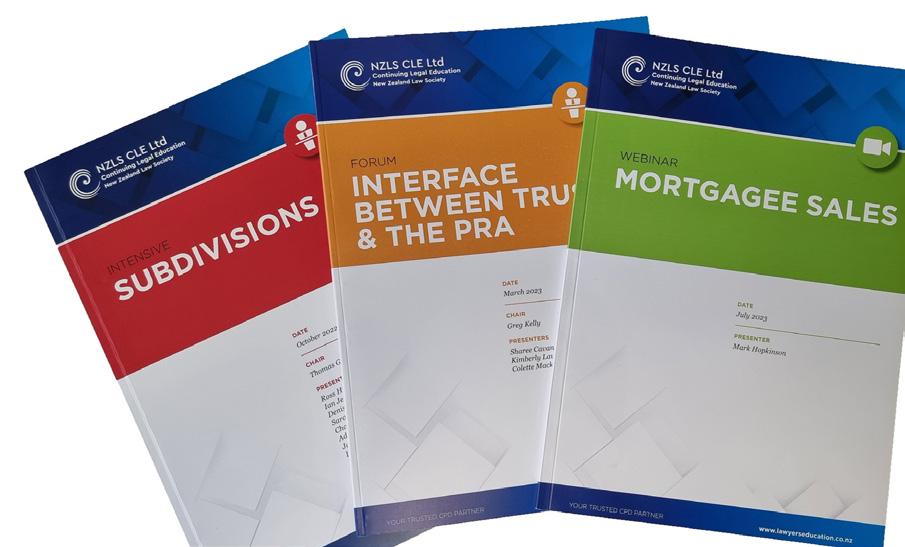
• Health and Safety Update
• Residential Property Update
• An Employee in 2023?
• Mortgagee Sales
• Estate Adminstration – tips and tricks
• Subdivisions
Full list of titles on our website lawyerseducation.co.nz
Books available as hardcopy or PDF

Take your legal career to the next level


New Zealand
The


Gain a New Zealand Diploma in Legal Executive Studies
Diploma in Legal Executive Studies (Level 6)
New
Diploma
Legal Executive Studies
Through flexible and online learning you
fit study around your job and life, and
the first steps to the career you want. Enrolments open now openpolytechnic.ac.nz | 0508 600 250
Zealand
in
offered by Open Polytechnic | Te Pūkenga is recognised throughout the legal profession. As a graduate, you will be qualified to work as a legal executive under the supervision of a practising lawyer.
can
take















































